Your search “Keep%20the%20death%20penalty%abolished%20in%20the%20ePhilippfines%20e%20e%20e%20e%20e%20e%20e%20e%20e%20e%20e%20e/page/q26%individuals%20than%20eOhio%intends%20to%20eexecute%20death%20esuffer%20efrom%20esome%20ecombination%20of%20esevere%20emental%20eillness,%intellectual%20edisability,%20eserious%20echildhood%20etrauma%20efrom%20ephysical%20and%20esexual%20abuse,%20for%20ewere%20eyoung%20eadults%20ewith%20eimpaired%20ejudgment%20ewhen%20the%20ecommitted%their%20ecrimes. ”
Document(s)
Deathworthy: a mental health perspective of the death penalty
By Project 39A, on 7 October 2021
2021
Academic report
India
Mental Illness
More details See the document
A first of its kind report, Deathworthy, presents empirical data on mental illness and intellectual disability among death row prisoners in India and the psychological consequences of living on death row. The report finds that an overwhelming majority of death row prisoners interviewed (62.2%) had a mental illness and 11% had intellectual disability. The proportion of persons with mental illness and intellectual disability on death row is overwhelmingly higher than the proportion in the community population. The report also establishes correlations between conditions of death row incarceration and mental illness and ill-health. Led and conceptualised by Maitreyi Misra (Head, Mental Health and Criminal Justice, Project 39A, National Law University Delhi), the study was conducted under the guidance of Dr. Pratima Murthy (Director, NIMHANS), Dr Sanjeev Jain (Senior Professor, Deptt of Psychiatry, NIMHANS) and Dr Gitanjali Narayanan (Associate Professor, Deptt of Psychology, NIMHANS).
- Document type Academic report
- Countries list India
- Themes list Mental Illness
Document(s)
Government Misconduct and Convicting the Innocent, The Role of Prosecutors, Police and Other Law Enforcement
By Samuel R. Gross, Maurice J. Possley, Kaitlin Jackson Roll, Klara Huber Stephens , on 20 July 2022
2022
Academic report
Innocence
More details See the document
This is a report about the role of official misconduct in the conviction of innocent people. We
discuss cases that are listed in the National Registry of Exonerations, an ongoing online archive
that includes all known exonerations in the United States since 1989, 2,663 as of this writing.
This Report describes official misconduct in the first 2,400 exonerations in the Registry, those
posted by February 27, 2019
- Document type Academic report
- Themes list Innocence
Document(s)
“No One Believed Me”: A Global Overview of Women Facing the Death Penalty for Drug Offenses
on 5 October 2021
2021
NGO report
Drug Offenses
Women
frMore details See the document
“No one believed me” is a quote from Merri Utami, who was sentenced to death for drug trafficking in Indonesia in 2002. Her quote reflects the injustices faced by women accused of capital drug offenses around the world: many decision-makers disbelieve women’s plausible innocence claims or discount the effects of relationships and economic instability on women’s decisions to traffic drugs.
Document(s)
Defending Women and Transgender Persons Facing Extreme Sentences: A Practical Guide
on 14 January 2022
2022
Legal Representation
Legal Representation
Women
frMore details See the document
Written by a team including experts in the fields of capital defense, gender rights, gender-sensitive mitigation and the rights of transgender persons, the guide includes sections on gender-based violence, women’s mental health, prison conditions, discrimination in the legal system, working with the media, and how to build a gender-sensitive team. It also includes a step-by-step gender-sensitive interview protocol that builds on resources developed by the anti-violence community and is tailored to the needs of defense teams.
- Document type Legal Representation
- Themes list Legal Representation / Women
- Available languages Défendre les femmes et les personnes transgenres confrontées à des peines extrêmes
Document(s)
The Power of Example: Whither The Biden Death Penalty Promise?
on 21 July 2022
2022
NGO report
United States
More details Download [ pdf - 4342 Ko ]
“The President, his administration and Congress must recognize that respect for human dignity and retention of the death penalty are incompatible; that respect for the rule of law must include international human rights law guaranteeing protection of the rights of those facing the death penalty; that upholding universal rights must include upholding the right of everyone to life and freedom from cruel, inhuman or degrading treatment or punishment; and that making international institutions stronger must include implementing the conclusions of UN human rights treaty bodies,”
- Document type NGO report
- Countries list United States
Document(s)
The Culture of Capital Punishment in Japan
By David T. Johnson, on 4 July 2020
2020
Academic report
Japan
More details See the document
Japan retains the death penalty for three main reasons: because it missed a major opportunity for abolition in the postwar Occupation, because of the long hegemony of the (conservative) Liberal Democratic Party, and because (like the United States and China) it has sufficient size, economic influence, and political clout to enable it to defy human rights norms. Capital punishment also persists in Japan because it performs welcome functions for politicians, prosecutors, media, and the public.
Despite widespread belief to the contrary, capital punishment in Japan does not deter homicide better than long terms of imprisonment do.
- Document type Academic report
- Countries list Japan
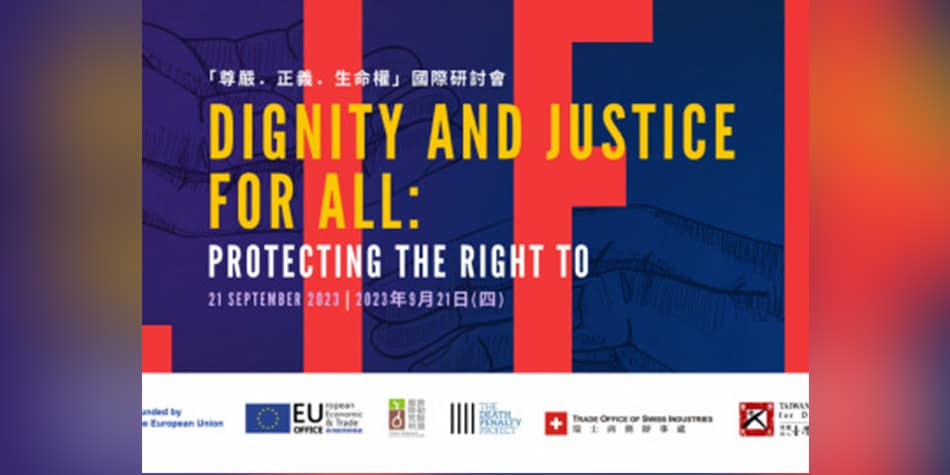
Article(s)
International Symposium on the Right to Life in Taiwan
By Taiwan Alliance to End the Death Penalty (TAEDP), on 12 January 2024
The Taiwan Alliance to End the Death Penalty (TAEDP) held a series of events including an international seminar, prison visit, and meetings that took place from 19-22 September 2023 to celebrate its 20th anniversary.
2024
Cruel, Inhuman and Degrading Treatment and Punishment
Death Row Conditions
India
Taiwan
Document(s)
The Myth of Autonomy Rights
By Kathryn E. Miller, on 20 July 2022
2022
Article
United States
More details See the document
Supreme Court rhetoric, scholarly discussion, blackletter law, and ethical rules have perpetuated a myth that individual rights protect the autonomy of defendants within the criminal legal system. To expose this myth, I examine six rights that the Court has enshrined as essential decision points for criminal defendants due to the rights’ purported expressive and consequential functions: (1) the right to self-representation; (2) the right to plead guilty; (3) the right to waive a jury; (4) the right to testify; (5) the right to waive appeals; and (6) the right to maintain innocence at a capital trial. I conclude that each of these rights fails to protect defendant autonomy.
I then argue that genuine displays of autonomy under the criminal legal system take the form of resistance to the law, legal advocates, and the legal system. Thus, the autonomy of criminal defendants occurs not because of law but in spite of it. As such, scholarly discussions of the personal autonomy of criminal defendants should focus not on rights and rules but on acts of resistance. The current autonomy rights discourse is harmful because it obscures the system’s defects by framing discussions around individual rights instead of structural limitations. This lends itself to solutions involving procedural tinkering to better actualize individual rights instead of radical structural reform or abolition. By obscuring these structural defects and stressing the system’s protective qualities, the autonomy rights discourse presents the system not only as legitimate, but as functional, and potentially even successful. As such, a new scholarly frame is warranted: autonomy as resistance to law and the legal system. By illuminating the ways in which autonomy in the criminal legal system resembles autonomy under the American institution of slavery, the autonomy as resistance frame exposes the need for radical structural change and facilitates a reimagining of the criminal legal system.
- Document type Article
- Countries list United States
Document(s)
Sentenced to Death Without Execution
on 15 December 2020
2020
NGO report
Antigua and Barbuda
Barbados
Dominica
Grenada
Saint Kitts and Nevis
Saint Lucia
Saint Vincent and the Grenadines
Trend Towards Abolition
More details Download [ pdf - 1597 Ko ]
This research is a contribution towards understanding why six small, independent island nations in the
Eastern Caribbean – Antigua and Barbuda, Dominica, Grenada, St Kitts and Nevis, St Lucia, and St
Vincent and the Grenadines, all members of the OECS – and the neighbouring island of Barbados retain
the death penalty in their criminal statutes, and yet have not executed anyone sentenced to death for a
very long time. With the exception of St Kitts and Nevis, where an execution took place in 2008, no-one
has been judicially executed in any of the other countries for more than 20 years – and in Dominica,
Grenada, St Lucia and Barbados for more than 30 years. Furthermore, death sentences have been imposed
within the past 10 years only in St Lucia and Barbados, and in four of these seven nations no-one is under
sentence of death on ‘death row’ at the time of writing.
The questions posed by this publication are: why do these countries hang on to capital punishment
and what are the barriers and hindrances to the complete abolition of capital punishment by these
nations
- Document type NGO report
- Countries list Antigua and Barbuda / Barbados / Dominica / Grenada / Saint Kitts and Nevis / Saint Lucia / Saint Vincent and the Grenadines
- Themes list Trend Towards Abolition
Document(s)
Gender, Violence, and the Death Penalty
By Sandra Babcock and Nathalie Greenfield, California Western International Law Journal , on 1 February 2024
2024
Academic Article
Gender
Women
More details See the document
Published in 2023.
This article is the first in a series that will systematically explore how gender has affected the criminal proceedings of women currently on death row. For this inaugural article, we have undertaken the first—and, to our knowledge, only comprehensive analysis of gender-based violence (“GBV”) in the lives of all women currently on death row, examining the prevalence of GBV and how it has shaped the lives and affected the criminal prosecutions of women facing execution. Our research reveals, for the first time, that almost every woman on death row in the United States has experienced GBV. Indeed,the great majority have experienced more than one incident of GBV in their lifetime. Our findings align with previous studies demonstrating that women’s pathways to incarceration are paved with physical, sexual, and psychological abuse. Our research further shows that both in the United States and around the world, defense attorneys frequently fail to present evidence of GBV in women’s capital trials. When they do introduce such evidence, they fail to fully explain the nature of their clients’ victimization and the harm they have suffered as a result. Moreover, prosecutors frequently rely on gendered tropes to discredit women’s accounts of violence such as childhood sexual abuse, rape, and intimate partner violence. Consequently, those who sentence women to die rarely comprehend the extensive trauma that the women have endured throughout their lives, and how that trauma relates to their legal and moral culpability.
- Document type Academic Article
- Themes list Gender / Women
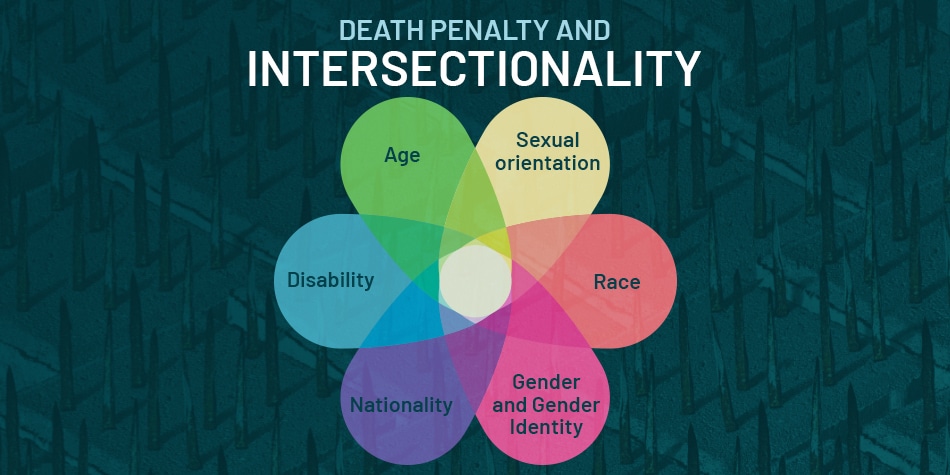
Article(s)
Joint statement on the death penalty and human rights of women and LGBTQIA+ individuals
By World Coalition Against the Death Penalty, on 10 October 2022
20th World Day against the Death Penalty On this 20th anniversary of the World Day Against the Death Penalty dedicated to the link between torture and the use of the death penalty and in continuation of the 2021 World Day Against the Death Penalty dedicated to women facing capital punishment, sentenced to death, executed, pardoned […]
2022
Cruel, Inhuman and Degrading Treatment and Punishment
Death Row Conditions
Fair Trial
Women
Document(s)
“Don’t let them kill us”: Iran’s relentless execution crisis since the 2022 uprising
By Amnesty International, on 4 April 2024
2024
NGO report
Iran (Islamic Republic of)
faMore details See the document
Published in 2024.
This research briefing documents the horrifying surge in executions in Iran in 2023, the highest in eight years. More than half of the executions were for drug-related offences amid a distressing return to a lethal antinarcotics policy since Ebrahim Raisi’s rise to presidency in 2021. With systemic impunity in Iran, the briefing reiterates the need for states to initiate criminal investigations under the principle of universal jurisdiction into crimes under international law committed by Iranian officials, irrespective of the absence or presence of the accused in their territory. Since the “Woman Life Freedom” uprising of September-December 2022, the Iranian authorities have weaponized the death penalty to create a pervasive climate of fear across the country, exert control over the population, and suppress dissent and any challenge to their iron grip on power. As a result, 2023 saw an exponential increase in the number of recorded executions. The authorities executed at least 853 people in 2023, a 48% increase from 2022 when 576 people were executed and a 172% increase from 2021 when 314 people were executed. Amnesty International believes that the real number of executions is higher, but the Iranian authorities are not transparent about the number of people executed each year and do not make data on executions publicly available.
- Document type NGO report
- Countries list Iran (Islamic Republic of)
- Available languages « ن گ راذ ی د ام ار دنشکب » نارحب مادعا یب یاه ناما رد اریا شزیخ نامز زا ن لاس 1
Document(s)
Gender Matters: Women on Death Row in the United States
By Sandra Babcock, Nathalie Greenfield, Kathryn Adamson, Cardozo Law Review , on 24 April 2024
2024
Academic report
Gender
United States
Women
More details See the document
This article presents a comprehensive study of 48 persons sentenced to death between 1990 and 2023 who presented as women at the time of their trials. This research is the first of its kind to conduct a holistic and intersectional analysis of the factors driving women’s death sentences. It reveals commonalities across women’s cases, delving into their experiences of motherhood, gender-based violence and prior involvement with the criminal legal system. This report also explore the nature of the women’s crimes of conviction, including the role of male co-defendants and the State’s use of aggravating factors. Finally, it reveals for the first time the extent to which capital prosecutions are dominated by men—including judges, elected District Attorneys, defense attorneys, and juror forepersons—and explain why gender matters in determining who lives and who dies
- Document type Academic report
- Countries list United States
- Themes list Gender / Women
Document(s)
The Death Penalty in Kenya: A Punishment that has Died Out in Practice, Part One – A Public Ready to Accept Abolition
on 15 June 2022
2022
NGO report
Kenya
Public Opinion
More details See the document
In 2021, The Death Penalty Project and the Kenya National Commission on Human Rights, in partnership with the Australian National University commissioned Prof. Carolyn Hoyle, Director of The Death Penalty Research Unit, at the University of Oxford, to undertake research in order to provide accurate data on attitudes towards the death penalty in Kenya and facilitate a constructive conversation on the future of capital punishment. The research examined the views of both the general public in Kenya and also opinion formers, those considered influential in shaping, and responding to, national views.
Key findings:
– 40% in favour of abolishing the death penalty, 10% did not know either way
– 51% in favour of retaining the death penalty, only 32% strongly in favour
– Those against the death penalty believed that criminals deserved the opportunity for rehabilitation.
– Knowledge of the death penalty appears to be limited, just 66% were aware Kenya retains the death penalty and just 21% knew no executions had take place in the past 10 years
– The public expressed concerns around the possibility that innocent people could be sentenced to death: 61% of the public – including retentionists – thought that ‘many’ or ‘some’ innocent people have been sentenced to death in Kenya; only 8% thought that ‘no innocent people have been sentenced to death’
– Public support fell from 51% to 31% when considering abolition in the region
59% of the public, who were initially in favour of retention, said that they would accept a new policy of abolition
- Document type NGO report
- Countries list Kenya
- Themes list Public Opinion
Document(s)
Prison Conditions in Jamaica
on 19 April 2011
2011
NGO report
Death Row Conditions
Jamaica
More details Download [ pdf - 396 Ko ]
In criminal justice matters, Jamaica has been rightly praised for its de-facto abolitionist
stance on the death penalty: nobody has been executed on the island since 1988.
However, the alternative to death is imprisonment. For many years, NGOs, the UN
Human Rights Committee, the Inter-American Commission on Human Rights, and
various independent and internal reports have expressed serious concern about the
conditions in which Jamaica detains its prisoners.
- Document type NGO report
- Countries list Jamaica
- Themes list Death Row Conditions
Document(s)
The Death Penalty in Kenya: A Punishment that has Died Out in Practice, Part Two – Overwhelming Support for Abolition Among Opinion Leaders
on 15 June 2022
2022
NGO report
Kenya
Public Opinion
More details See the document
In 2021, The Death Penalty Project and the Kenya National Commission on Human Rights, in partnership with the Australian National University commissioned Prof. Carolyn Hoyle, Director of The Death Penalty Research Unit, at the University of Oxford, to undertake research in order to provide accurate data on attitudes towards the death penalty in Kenya and facilitate a constructive conversation on the future of capital punishment. The research examined the views of both the general public in Kenya and also opinion formers, those considered influential in shaping, and responding to, national views.
Key findings :
– The vast majority of opinion formers that took part in the interviews were in favour of abolishing the death penalty.
– 90% of opinion formers were in favour of abolishing the death penalty
– 82% of opinion formers were strongly in favour of of abolishing the death penalty
– Most of the opinion formers interviewed were very well informed on the administration of the death penalty in Kenya.
– Across both groups there were concerns around the possibility that innocent people could be sentenced to death.
– 88% of opinion formers believe wrongful convictions occur fairly regularly
– 93% of opinion formers thought Kenya should be influenced by high rates of abolition around the world
– Opinion formers believed that 75% of the public would accept abolition of the death penalty, despite initial reservations.
- Document type NGO report
- Countries list Kenya
- Themes list Public Opinion
Document(s)
A Deadly Distraction, Why the Death Penalty is not the Answer to Rape in South Asia
on 25 May 2022
2022
Arguments against the death penalty
NGO report
Bangladesh
India
Pakistan
Sri Lanka
More details See the document
Since 2010, persons convicted of rape offences were executed in at least 9 countries, including India and Pakistan. Moreover, public protests against the rape epidemic, which led governments to introduce capital rape laws, illustrates the need to shine a spotlight in South Asia.
The report examines the use of the death penalty for rape in four South Asian countries: Bangladesh, India, Pakistan and Sri Lanka and explores ways that anti-death penalty activists can challenge this concerning trend.
- Document type Arguments against the death penalty / NGO report
- Countries list Bangladesh / India / Pakistan / Sri Lanka
Document(s)
Women and The Death Penalty in Kenya: Essays on the Gendered Perspective of the Death Penalty
on 2 February 2024
2024
NGO report
Death Row Conditions
Fair Trial
Gender
Kenya
Women
More details See the document
This publication seeks to make visible the gender and intersectional discrimination faced by women in the judicial process leading to the death penalty. Through the various articlesin this publication, the authors bring to light the reality of women facing the death penalty through a different lens.
The first author, Shekinah Bright Kiting’a, in making a compelling case for abolition of the death penalty, explores how the death penalty uniquely affects women in the context of motherhood. Further, she highlights the rights and well-being of the children affected by their mothers’ death sentences, revealing flaws in our legal and ethical systems. With the overall aim of advocating for its abolition due to its significant impact on both parenthood and children’s rights, her article seeks to push for reforms that honour motherhood and prioritize children’s well-being in these difficult circumstances.
Kenaya Komba dissects gender disparity in the judicial system by exploring the intersection of domestic violence and the death penalty. In making a case for a restorative approach to justice, her article analyses the impact of capital punishment on victims of domestic violence and the systemic injustice and biases they continue to grapple with. Her elaborate analysis of the Constitution of Kenya, 2010 and the Protection Against Domestic Violence Act, 2016, highlights the urgent need for reform in the legal system.
While Analyzing the role the media plays in shaping perceptions of women on death row, Patricia Chepkirui evaluates the implications of positive and negative media portrayals of such women by highlighting the ethical responsibilities of media in the coverage of women on death row cases. The article ultimately underscores the significance of responsiblemedia coverage in ensuring that media exposure of cases of women on death row is fair,balanced, and respectful of their rights and dignity.
Alex Tamei delves into the intricacies of abuse, gender-based violence, and trauma as mitigating factors in death penalty sentencing for women. His article comparatively analyses two Kenyan cases of murder in retaliation to intimate partner violence, seeking to shed light on the plight of victims of gender-based violence. The article effortlessly brings out the nexus between the death penalty and intimate partner violence and makessolid recommendations for change.
The fifth author, Patience Chepchirchir, delves into the nexus between psychological abuse and provocation. Through her article, she brings out the scope of psychological abuse while focusing on the linkage between emotional abuse and provocation and how the same can be considered as mitigating factors. Through an elaborate analysis of case law, she makes a case for psychological abuse of women as a mitigating circumstance during sentencing.
Stella Cherono’s article reflects on the intersectional discrimination faced by women in the criminal trial process leading to death row. The article highlights the complex and overlapping forms of discrimination women experience during the pretrial, trial and sentencing stages. Through her comprehensive analysis of gendered pathways to offending and imprisonment, she challenges how society perceives discrimination.
Loraine Koskei Interrogates the emerging jurisprudence on Intimate Partner Violence.Her article lays out the gendered factor in the commissioning and sentencing of women convicted of murder and offers possible recommendations.
- Document type NGO report
- Countries list Kenya
- Themes list Death Row Conditions / Fair Trial / Gender / Women
Document(s)
Annual Report On the Death Penalty in Iran 2023
By Iran Human Rights (IHRNGO) with the support of ECPM (Together Against the Death Penalty), on 14 March 2024
2024
NGO report
Iran (Islamic Republic of)
More details See the document
Published on March 5, 2024
This report has been drafted by Iran Human Rights (IHRNGO) with the support of ECPM (Together Against the Death Penalty). Since 2012, Iran Human Rights and ECPM have been working together for the publication, international release and distribution of annual reports on the death penalty in Iran.
The 16th annual report on the death penalty by Iran Human Rights and ECPM (Together Against the Death Penalty) provides an assessment and analysis of the 2023 death penalty trends in 2023 in the Islamic Republic of Iran. It sets out the number of executions in 2023, the trend compared to previous years, the legislative framework and procedures, charges, geographic distribution and a monthly breakdown of executions. Lists of the female and juvenile offenders executed in 2023 are also included in the tables. The report also looks into the abolitionist movement within Iran, including the forgiveness movement and its contribution to reducing the use of the death penalty, and provides analysis on how the international community can contribute to limiting the scope of the death penalty in Iran. The 2023 report is the result of hard work from Iran Human Rights members and supporters who took part in reporting, documenting, collecting, analysing and writing of its contents. We are especially grateful to Iran Human Rights sources inside Iran who incur a significant risk by reporting on unannounced and secret executions in prisons of 30 different provinces. Due to the very difficult context, the lack of transparency and the obvious risks and limitations that human rights defenders face in the Islamic Republic of Iran, this report does not give a complete picture of the use of the death penalty in Iran by any means. There are 46 reported executions which are not included in this report due to a lack of sufficient details or an inability to confirm cases through two different sources. However, it aims to provide the most complete and realistic figures possible in the present circumstances. The current report does not include suspicious deaths in custody, death row prisoners who died in prison before the executions or those killed under torture. ECPM supports the elaboration, editing process, publishing and distribution of this report in the framework of its international advocacy work against the death penalty. The problems of transparency on the data and information about the death penalty in Iran should be overcome by a strong strategy of distribution and dissemination. The overall objectives of this report for Iran Human Rights and ECPM are to call attention to and publicise the facts, in order to change national and international views on the situation of the death penalty in Iran, first executioner country in the world.
- Document type NGO report
- Countries list Iran (Islamic Republic of)
Document(s)
Death Penalty in the OSCE Area: Background Paper 2021
By Organization for Security and Co-operation in Europe (OSCE) , on 14 January 2022
2022
Regional body report
Belarus
United States
ruMore details See the document
This paper updates The Death Penalty in the OSCE Area: Background Paper 2020. It is intended to provide a concise update to highlight changes in the status of the death penalty in OSCE participating States since the previous publication and to promote constructive discussion of the issue. It covers the period from 1 April 2020 to 31 March 2021. Special Focus: The road to abolition in selected OSCE participating States
- Document type Regional body report
- Countries list Belarus / United States
- Available languages Смертная казнь в регионе ОБСЕ, Справочный документ 2021 года
Document(s)
World Psychiatric Association position statement mental health and the death penalty
By World Psychiatric Association, on 30 November 2023
2023
Arguments against the death penalty
Fair Trial
Intellectual Disability
zh-hantMore details See the document
International law and laws of various countries prohibit the imposition of the death penalty on persons
with mental illness or developmental and intellectual disabilities due to the special barriers faced by
them in defending themselves; their limited moral culpability; and their diminished ability to
understand the nature and reason for their execution. However, due to lack of accommodations in
criminal proceedings and legal safeguards, persons with mental illness, developmental and intellectual
disabilities are at a greater risk of being sentenced to death and having their fair trial rights denied.
Authors:
Maitreyi Misra, Director (Mental Health and Criminal Justice), Project 39A, National Law University
Delhi.
Namrata Sinha, Research Associate (Mental Health and Criminal Justice), Project 39A, National Law
University Delhi.
Neeraj Gill, Professor, Health Research Institute, University of Canberra and Griffith University,
School of Medicine, Griffith University, Gold Coast, Australia.
Soumitra Pathare, Consultant Psychiatrist, Director, Centre for Mental Health Law and Policy, ILS
Law College, Pune.
Afzal Javed, President, World Psychiatric Association.
- Document type Arguments against the death penalty
- Themes list Fair Trial / Intellectual Disability
- Available languages 世界精神醫學會針對精神健康與死刑之立場聲明
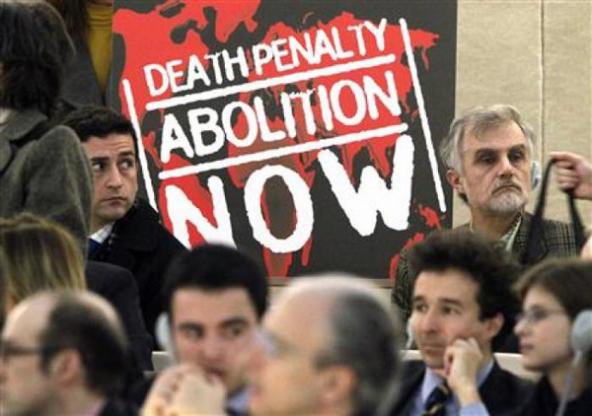
Article(s)
A challenge to the abolitionist movement
By Sandra Babcock, on 16 December 2011
Over the last few decades, we have made great strides toward the universal abolition of the death penalty. Nevertheless, despite the progress we have made, the death penalty remains entrenched in a significant number of states. And even in those nations that have refrained from carrying out executions in a sort of de facto moratorium, […]
2011
Intellectual Disability
Malawi
Mental Illness
Mexico
Moratorium
United States
Document(s)
The Death Penalty in 2021: Year End Report
By Death Penalty Information Center, on 14 January 2022
2022
NGO report
United States
More details See the document
The death penalty in the USA in 2021 was defined by two competing forces: the continuing long-term erosion of capital punishment across most of the country, and extreme conduct by a dwindling number of outlier jurisdictions to continue to pursue death sentences and executions.
- Document type NGO report
- Countries list United States
Document(s)
Annual Report on The Death Penalty In Iran 2021
on 28 April 2022
2022
NGO report
Iran (Islamic Republic of)
frMore details See the document
The 120-page report assesses and analyses trends in death penalty practices in order to propose recommendations, tailored to the national context, and to engage in a constructive dialogue on capital punishment in the country.
The death penalty situation in the Islamic Republic of Iran remains alarming with a significant increase in executions in 2021 (+25%) and an increasing number of Iranian women being executed. The number of executions has doubled after the election of Ebrahim Raeisi as President, and as the Islamic Republic and Western governments negotiate to revive the nuclear deal, also called the Joint Comprehensive Plan of Action (JCPOA). These are some of the main findings of the 14th Annual Report on the Death Penalty in Iran by Iran Human Rights (IHRNGO) and Ensemble Contre la Peine de Mort (ECPM) released today.
- Document type NGO report
- Countries list Iran (Islamic Republic of)
- Available languages Rapport annuel sur la peine de mort en Iran 2021
Document(s)
From Advocacy To Abolition: How The Universal Periodic Review Can Shape The Trajectory Of The Abolition Of The Death Penalty
By Amy Bergquist, California Western, School of Law, on 1 February 2024
2024
Academic Article
Trend Towards Abolition
More details See the document
Published in 2023.
This article assesses whether there is evidence to suggest that the UPR can influence the timing of a country’s decision to abolish the death penalty. The evidence arises out of the examination of thirty case studies of countries that abolished the death penalty, or ratifiedthe leading treaty calling for abolition. This article concludes that in some circumstances the UPR does appear to influence that timing. These conclusions can assist civil society organizations as they refine their advocacy to encourage more countries to abolish the death penalty.
Part I of this article offers an introduction to the global abolitionist movement and two of its advocacy targets: the U.N. Human Rights Council and the UPR. Part II makes the case for focusing on the UPR to assess the efficacy of U.N. advocacy. Part III describes the process of abolition and offers several theories as to how the UPR might influence a country’s trajectory toward abolition. Part IV sets out the study’s methodology and encompasses the analysis of the case studies, focusing first on countries that have abolished the death penalty early in a UPR cycle, then on countries that have abolished at mid-cycle, and finally on countries that have abolished during the tail end of the cycle. The conclusion discusses the implications of these findings for civil society organizations working toward abolition of the death penalty.
- Document type Academic Article
- Themes list Trend Towards Abolition
Document(s)
Worked to Death: A study on migrant workers and capital punishment
By Migrant Care and Reprieve, on 24 November 2021
2021
NGO report
Fair Trial
Indonesia
Legal Representation
Malaysia
Nigeria
Pakistan
Saudi Arabia
Women
More details See the document
Foreign nationals, and within this group migrant workers, are a population that disproportionately faces the death penalty around the world. The data and statistics gathered by Reprieve and Migrant CARE for this report show that migrant workers as a sub-set of the foreign national population are at grave risk of human rights violations related to the death penalty, including arbitrary deprivation of the right to life in the context of unlawful death sentences and executions.
This report focuses on: states that receive migrant workers (‘receiving states’), in particular the states that make up the Association of South East Asian Nations or ASEAN (‘South East Asian states’) and the Gulf Cooperation Council (‘Gulf states’), and on states from which migrant workers travel to work (‘sending states’).
- Document type NGO report
- Countries list Indonesia / Malaysia / Nigeria / Pakistan / Saudi Arabia
- Themes list Fair Trial / Legal Representation / Women
Document(s)
Killing in the Name of God: State-sanctioned Violations of Religious Freedom
By Eleos Justice, Monash University, on 10 November 2021
2021
Academic report
Brunei Darussalam
Iran (Islamic Republic of)
Maldives
Mauritania
Nigeria
Qatar
Saudi Arabia
Somalia
United Arab Emirates
Yemen
More details See the document
As of 2020, blasphemy was formally criminalised in some 84 countries. As many as 21 countries criminalised apostasy as of 2019. The legal penalties for such offences range from fines to imprisonment to corporal punishment—and in at least 12 countries, the death penalty.
This report examines the extent to which States commit, or are complicit in, killings that violate religious freedom. Focussing on the 12 States in which offences against religion are lawfully punishable by death, we examine four different types of State-sanctioned killings on the basis of religious offence (apostasy, blasphemy, or alike) or affiliation (most commonly, membership of a religious minority): judicial executions, extrajudicial killings, killings by civilians, and killings by extremist groups. We explore the relationship between the retention of the death penalty for religious offences and other forms of State-sanctioned killings motivated by alleged religious offending or by religious identity.
- Document type Academic report
- Countries list Brunei Darussalam / Iran (Islamic Republic of) / Maldives / Mauritania / Nigeria / Qatar / Saudi Arabia / Somalia / United Arab Emirates / Yemen
Document(s)
How to Insert Gender issues in Abolitionist Advocacy?
By World Coalition against the Death Penalty, on 1 August 2023
2023
Lobbying
Gender
frMore details Download [ pdf - 710 Ko ]
This tool was developed by the World Coalition Against the Death Penalty (World Coalition) in partnership with the Advocates for Human Rights (TAHR), after noting the limited integration of gender issues into the abolitionist advocacy of the World Coalition’s member organizations. This tool has also been edited and enrichened by the World Coalition’s Gender Working Group.
As part of the “Leave No Woman Behind on Death Row” project, this tool aims to assist World Coalition members and partners in implementing gender-sensitive abolitionist advocacy.
In this document, intended to be a practical tool, guidance is provided on how to incorporate gender-specific recommendations into abolitionist advocacy with human rights bodies. This tool focuses recommendations made by civil society organizations (CSOs) to international and regional human rights bodies, intended to encourage national authorities to act in a certain way. Human rights mechanisms and bodies serve as crucial actors in legitimizing and supporting CSOs work on the ground. A recommendation made by a CSO can, in turn, be accepted by a human rights special mechanism and be transformed into an official recommendation to the State. From there, CSOs can continue to use this official recommendation in their national advocacy to strengthen their claim and position, fulfilling a virtuous circle in advocacy work.
In this document, the recommendations made are done pending full abolition of the death penalty. They are seen as transitional steps towards full abolition of the death penalty in law and in practice.
This tool is divided into two sections. The first part focuses on how to increase visibility of the discrimination faced by women in the judicial process leading to the death penalty. The second part focuses on the discrimination faced by LGBTQIA+ people during the same judicial process. In both sections, definitions are provided as well as background information in order to understand the issues at stake in each of the themes.
- Document type Lobbying
- Themes list Gender
- Available languages Comment insérer les questions de genre dans le plaidoyer abolitionniste ?
Document(s)
How to Work with Parliamentarians for the Abolition of the Death Penalty
By World Coalition Against the Death Penalty, on 7 October 2021
2021
Working with...
World Coalition
Moratorium
Public Opinion
frMore details Download [ pdf - 18114 Ko ]
This how-to guide, elaborated with Parliamentarians for Global Action with highlights coming from the African continent, is specifically designed for the use of abolitionist civil society groups who want to work with parliamentarians for the abolition of the death penalty.
- Document type Working with... / World Coalition
- Themes list Moratorium / Public Opinion
- Available languages Comment travailler avec les parlementaires pour l'abolition de la peine de mort ?
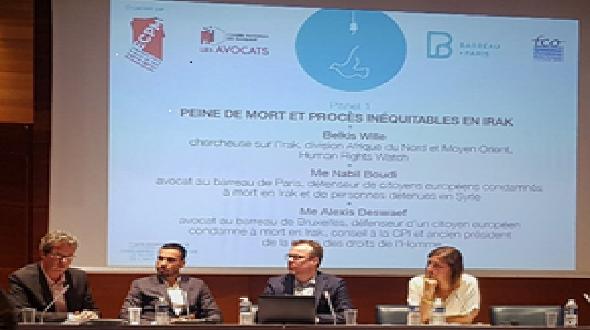
Article(s)
Unfair trials and the death penalty for terrorism in Iraq
By Majdoulin Sendadi, on 13 January 2020
From January until August 2019, Iraq executed more than 100 individuals accused of being affiliated with Daesh, according to Kurdish media network Rudaw.
2020
Iraq
Terrorism
Document(s)
The Public Opinion Myth. Why Japan retains the death penalty
By Mai Sato & Paul Bacon, on 5 August 2015
2015
Academic report
More details See the document
In this report, Mai Sato and Paul Bacon go beyond the simple results of opinion polls conducted
recently by the Japanese government, which show very high levels of support for the death penalty.
Using a similar methodology and sample, the authors reveal that the majority of the population form
their views on the death penalty with limited information and based on often inaccurate perceptions
– for example, believing that the crime rate is increasing. Sato and Bacon also demonstrate that
people have a relatively low level of ‘psychological ownership’ when it comes to the future of the death
penalty: the majority think that the government and experts should decide. Furthermore, discussions
about the death penalty among participants increased tolerance towards those with different views –
which, in turn, facilitated potential reform and change.
- Document type Academic report
Document(s)
Doomed to Repeat: The Legacy of Race in Tennessee’s Contemporary Death Penalty
By Death Penalty Information Center, on 16 June 2023
2023
NGO report
Fair Trial
United States
More details See the document
This report explores the current issues with capital punishment in Tennessee through a historical lens, tracing the origins of the use of the death penalty from lynchings and other forms of racial violence directed at Black Tennesseans. The stories of individuals and communities that have interacted with different facets of Tennessee’s justice system throughout history suggest that, in many ways, even though centuries have passed, the experiences of discrimination toward Tennessee’s communities of color continue. A meaningful understanding of the state’s history and its legacy of violence and racism is essential to avoid repeating the mistakes of the past.
- Document type NGO report
- Countries list United States
- Themes list Fair Trial
Document(s)
Amnesty International Global Report : Death Sentences and Executions 2021
on 25 May 2022
2022
NGO report
aresfrMore details Download [ pdf - 2638 Ko ]
2021 saw a worrying rise in executions and death sentences as some of the world’s most prolific executioners returned to business as usual and courts were unshackled from Covid-19 restrictions, Amnesty International said today in its annual review of the death penalty.
- Document type NGO report
- Available languages التقرير العالمي لمنظمة العفو الدولية أحكام وعمليات الإعدام في 2021Condenas A Muerte Y Ejecuciones 2021Condamnations à mort et exécutions 2021
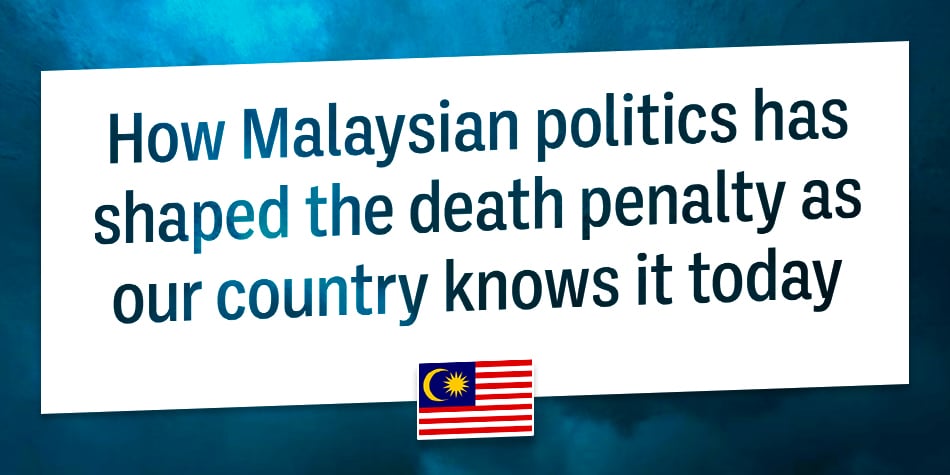
Article(s)
Malaysia and the Politics Behind the Death Penalty: A Tumultuous Relationship.
By Michelle Chew, on 24 October 2022
On 6 October 2022, the Malaysian government tabled bills abolishing the mandatory death penalty.
2022
Malaysia
Trend Towards Abolition
Document(s)
The Process of Abolishing the Death Penalty in Members States of the Organisation of Islamic Cooperation
By Nael Georges, ECPM, on 27 November 2020
2020
NGO report
Afghanistan
Albania
Algeria
Azerbaijan
Bahrain
Brunei Darussalam
Burkina Faso
Cameroon
Chad
Comoros
Djibouti
Egypt
Indonesia
Iran (Islamic Republic of)
Iraq
Jordan
Kazakhstan
Kuwait
Kyrgyzstan
Lebanon
Libya
Malaysia
Maldives
Mali
Morocco
Mozambique
Niger
Nigeria
Oman
Qatar
Saudi Arabia
Sierra Leone
Somalia
Sudan
Suriname
Tajikistan
Togo
Tunisia
Turkey
Turkmenistan
Uganda
United Arab Emirates
Uzbekistan
arfrMore details See the document
As the 47th session of the Council of Ministers of Foreign Affairs of the Organisation of Islamic Cooperation (OIC) is being held on 27-28 November 2020 in Niamey, Niger, ECPM and Nael Georges release this study, “The Process of Abolishing the Death Penalty in Member States of the Organisation of Islamic Cooperation”.
- Document type NGO report
- Countries list Afghanistan / Albania / Algeria / Azerbaijan / Bahrain / Brunei Darussalam / Burkina Faso / Cameroon / Chad / Comoros / Djibouti / Egypt / Indonesia / Iran (Islamic Republic of) / Iraq / Jordan / Kazakhstan / Kuwait / Kyrgyzstan / Lebanon / Libya / Malaysia / Maldives / Mali / Morocco / Mozambique / Niger / Nigeria / Oman / Qatar / Saudi Arabia / Sierra Leone / Somalia / Sudan / Suriname / Tajikistan / Togo / Tunisia / Turkey / Turkmenistan / Uganda / United Arab Emirates / Uzbekistan
- Available languages مسارمإلغاء عقوبة الإعدافي الدول الأعضاءفي منظمة التعاونالإسلاميLes processus d’abolition de la peine de mort dans les États membres de l’Organisation de la coopération islamique (OCI)
Document(s)
Felony Murder: An On-Ramp for Extreme Sentencing
By The Sentencing Project, Fair and Just Prosecution, on 23 March 2022
2022
NGO report
United States
More details See the document
Although other countries have largely rejected the felony murder doctrine, 48 states, the District of Columbia, and the federal government still use these laws. Felony murder laws compel harsh decades-long – or even life – sentences even when the individual charged did not directly cause or intend the loss of life.
This report evaluates the legal and empirical foundation, and failings, of the felony murder rule, profiles impacted individuals, and highlights recent reform efforts in 10 jurisdictions. Key findings include:
1. Felony murder laws widen the net of extreme sentencing and are counterproductive to public safety.
2. Felony murder laws have particularly adverse impacts on people of color, young people, and women.
3. Existing reforms must be expanded to achieve justice.
- Document type NGO report
- Countries list United States
Document(s)
Explaining the Invidious: How Race Influences Capital Punishment in America
By Sheri Lynn Johnson, James and Mark Flanagan, Cornell Law School, on 1 September 2022
2022
Academic report
United States
More details See the document
This article primarily focuses on how racial bias creates nearly ubiquitous racial disparities in the imposition of the death penalty; it does so both to amass further reasons McCleskey was wrongly decided, and to point the way forward. Part I provides the necessary foundation by summarizing the history of race and the death penalty in the United States, with a focus on the Supreme Court’s treatment of racial discrimination claims in capital sentencing. Part II, the heart of this Article, examines the multiple psychological mechanisms that create racially biased decision making in capital cases. Understanding those mechanisms further undercuts the Supreme Court’s reasoning in McCleskey and argues for overturning the holding. However, recognizing the reluctance with which today’s Court would view overturning McCleskey, Part III considers whether and how alternative, case-specific uses of the data described in Part II might ameliorate the influence of racial bias in capital sentencing.
- Document type Academic report
- Countries list United States
Document(s)
Death by Design: Part 1
By The Wren Collective , on 23 January 2024
2024
NGO report
Legal Representation
United States
More details See the document
Published in December 2023.
In “Death by Design” Parts 1 and 2, Wren investigated the state of court-appointed capital representation in Harris County—the death penalty capital of the world.The first report delves into the failings of the lawyers in capital cases.
Wren recommends a total overhaul to the system of capital representation for poor defendants in Harris County, with either the public defender absorbing those cases or the judges establishing a new, freestanding capital public defender that is independent from judicial oversight.
- Document type NGO report
- Countries list United States
- Themes list Legal Representation
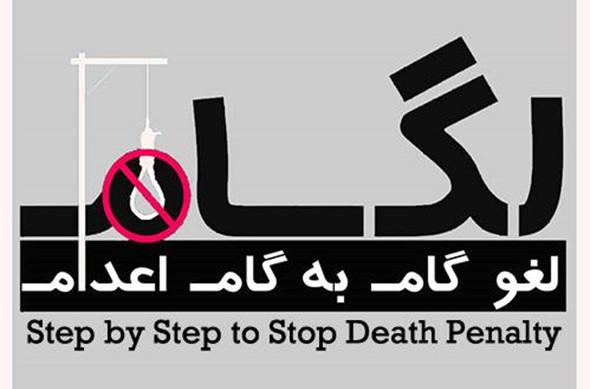
Article(s)
Iran’s brave human rights defenders and their struggle against the death penalty
By Amnesty International, on 5 March 2018
As the world moves away from the death penalty, Iran continues to execute hundreds of people every year and comes second only to China in the number of executions carried out annually. Amnesty International recorded nearly 1,000 executions in Iran in 2015 and at least 567 in 2016.
2018
Iran (Islamic Republic of)

Article(s)
The international responsibility of States
By Pierre Désert, on 25 June 2008
When a State ratifies a treaty, it undertakes to respect the undertakings that it has made before the whole of the international community. If it fails to meets its obligations and goes against the provisions of the treaty, it can be held responsible at international level.
2008
Document(s)
Guess Who’s Coming to Jury Duty? How the Failure to Collect Juror Demographic Data Contributes to Whithewashing the Jury Box
By Berkeley Law Death Penalty Clinic , on 30 April 2024
2024
Academic report
United States
More details See the document
Published on February 2024.
Founded in 2001, the Berkeley Law Death Penalty Clinic seeks justice for individuals facing capital punishment by providing high-quality representation and offers students a rich opportunity for meaningful, hands-on experience in high stakes, complex litigation. The clinic also tackles problems endemic to the administration of the death penalty and the criminal legal system.
The report continues the clinic’s racial justice research and advocacy by cataloging the states that gather prospective jurors’ self-identified race and ethnicity and those that do not. It examines what courts do with the information, including whether it is provided to the court and counsel for use during jury selection, and the consequences of these choices in furthering or obstructing jury representativeness and diversity. In particular, the report shows why the collection of prospective jurors’ self-identified race and ethnicity is vital to meeting state and federal fair cross-section guarantees and eliminating the discriminatory exercise of peremptory challenges.
- Document type Academic report
- Countries list United States
Document(s)
Migratory dependency and the death penalty: Foreign nationals facing capital punishment in the Gulf
By Lucy Harry, Carolyn Hoyle , and Jocelyn Hutton Death Penalty Research Unit, Centre for Criminology, University of Oxford, on 30 January 2024
2024
Academic Article
Jordan
Kuwait
Lebanon
Qatar
Saudi Arabia
United Arab Emirates
More details See the document
Published on July 2, 2023
This article focuses on the cases of 664 foreign nationals, the majority of whom are migrant workers, under sentence of death across the Gulf states (including Jordan and Lebanon) between 2016 and 2021. The features of these cases suggest that they are inextricably linked to migrant workers’ dependency under the kafala system, with examples of migrants duped into smuggling drugs across the border by their migrant broker, and once in country, accounts of violent altercations due to disputes about exit visas, and in the case of migrant domestic workers, self-defence against sexual violence. Engaging with the burgeoning literature on immigration, exploitation and criminalisation, as well as scholarship on capital punishment, this article will explore the multiple and unique layers of dependency fostered by the kafala system that place migrant workers at higher risk of the death penalty in these Gulf jurisdictions.
- Document type Academic Article
- Countries list Jordan / Kuwait / Lebanon / Qatar / Saudi Arabia / United Arab Emirates
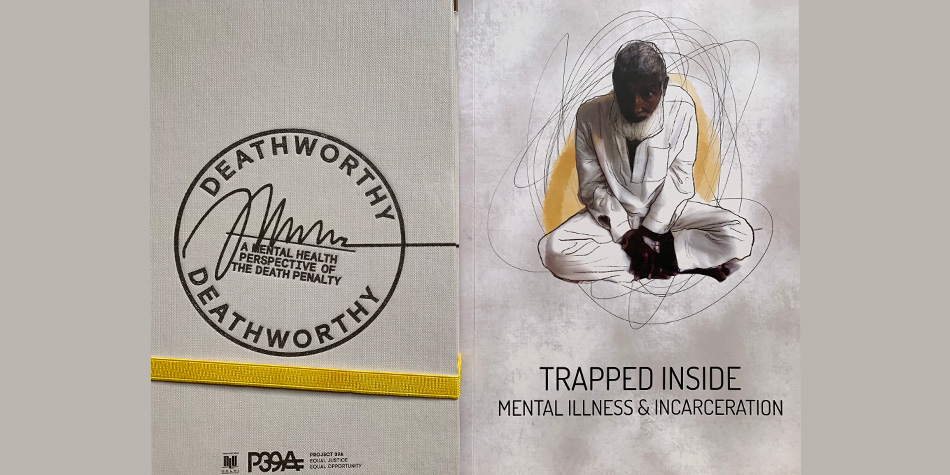
Article(s)
Over 8,000 people on death row in South Asia
By Aurelie Placais, staff, on 3 May 2022
With few executions but one of the biggest death rows in the world, South Asia is at a crossroad. Recent publications explore mental health on death row and social and economic background of people sentenced to death in Bangladesh, India, the Maldives, Pakistan and Sri Lanka.
2022
Bangladesh
Death Row Conditions
India
Maldives
Mental Illness
Pakistan
Sri Lanka

Article(s)
Follow-up to the initiative on the conditions of detention and treatment of death row prisoners
By Nordine Drici (Planète Réfugiés) & Sandrine Ageorges-Skinner (ECPM), on 10 June 2019
PRDH, in partnership with ECPM and the University of Grenoble-Alpes, organized a side event on the conditions of detention and treatment of death row prisoners worldwide during the 7th World Congress against the Death Penalty in Brussels (27 February – 1 March 2019) which provided food for thought and some areas of work thanks to the presence of some thirty participants working in more than 10 countries in Africa, Asia, Europe and Latin America. The results of these discussions are shared in this article.
2019
Document(s)
The Death Penalty in the OSCE Area: Background Paper 2020
By Organization for Security and Co-operation in Europe (OSCE), on 9 October 2020
2020
Regional body report
Belarus
United States
ruMore details See the document
This paper updates The Death Penalty in the OSCE Area: Background Paper 2019. It is intended to provide a concise update to highlight changes in the status of the death penalty in OSCE participating States since the previous publication and to promote constructive discussion of the issue. It covers the period from 1 April 2019 to 31 March 2020. Special Focus: Is the death penalty inherently arbitrary?
- Document type Regional body report
- Countries list Belarus / United States
- Available languages Смертная казнь в регионе ОБСЕ: Справочный документ 2020 года
Document(s)
The Death Penalty in 2022: Year End Report
By Death Penalty Information Center, on 16 December 2022
2022
NGO report
United States
More details See the document
In a year awash with incendiary political advertising that drove the public’s perception of rising crime to record highs, public support for capital punishment and jury verdicts for death remained near fifty-year lows. Defying conventional political wisdom, nearly every measure of change — from new death sentences imposed and executions conducted to public opinion polls and election results — pointed to the continuing durability of the more than 20-year sustained decline of the death penalty in the United States.
The Gallup crime survey, administered in the midst of the midterm elections while the capital trial for the 2018 mass shooting at Marjory Stoneman Douglas High School in Florida was underway, found that support for capital punishment remained within one percentage point of the half-century lows recorded in 2020 and 2021. The 20 new death sentences imposed in 2022 are fewer than in any year before the pandemic, and just 2 higher than the record lows of the prior two years. With the exception of the pandemic years of 2020 and 2021, the 18 executions in 2022 are the fewest since 1991.
- Document type NGO report
- Countries list United States
Document(s)
ICDP Launches How States abolish the Death Penalty: A Supplement of Case-Studies
By International Commission against the Death Penalty, on 17 November 2022
2022
NGO report
More details See the document
An increasing number of countries have recognized that state killing undermines human dignity and respect for human rights, such as the discriminatory use of the death penalty, the use of forced confession that increases the possibility of executing an innocent person, and the lack of deterrence effect of capital punishment. This move towards abolition of the death penalty is being witnessed in all regions of the world regardless of political system, religion, culture or tradition. As of today, at least 110 countries have abolished the death penalty for all crimes, while at least eight countries have abolished for ordinary crimes, while less than 20 countries have reportedly
carried out executions in 2021.
This publication is a supplement to the ICDP´s 2018 work on “How States Abolish the Death Penalty: 29 Case Studies.”
- Document type NGO report

Article(s)
Violations of the Right to Life in the Context of Drug Policies
By International Harm Reduction Association (IHRA), Corporación ATS Acción Técnica Social, IDPC Consortium, Washington Office on Latin America, non-governmental organizations in special consultative status, Anti-Death Penalty Asia Network (ADPAN); Capital Punishment Justice Project (CPJP); Centre on Drug Policy Evaluation (CDPE); Cornell Centre on the Death Penalty Worldwide; Eleos Justice - Monash University; Instituto RIA, AC; Iran Human Rights (IHR); World Coalition Against the Death Penalty., NGO(s) without consultative status, also share the views expressed in this statement, on 10 August 2021
Harm Reduction International and co-signatories congratulate Mr Tidball-Binz on his appointment as Special Rapporteur on summary executions. With this statement, we highlight key violations of the right to life enabled by repressive drug policies or reported in the context of drug law enforcement; and encourage this Rapporteur to pay specific attention to the impact of […]
2021
Death Row Conditions
Drug Offenses
Fair Trial
Document(s)
Resolution 77/274 – Moratorium on the use of the death penalty
By United Nations General Assembly, on 8 August 2022
2022
United Nations report
More details See the document
The present report provides information on the implementation of General Assembly resolution 75/183. It discusses developments towards the abolition of the death penalty and the establishment of moratoriums on executions and highlights trends in the use of the death penalty, including the application of international standards relating to the protection of the rights of those facing the death penalty. The report discusses conditions of detention for persons on death row, the application of the death penalty to foreign nationals, its disproportionate and discriminatory application to women, its disproportionate impact on poor and economically vulnerable individuals, its discriminatory use relating to persons exercising their human rights, and various initiatives for advancing its abolition. The report welcomes progress made towards universal abolition in States representing different legal systems, traditions, cultures and religious backgrounds. It concludes that all measures aimed towards limiting the application of the death penalty constitute progress in the protection of the right to life.
- Document type United Nations report
Document(s)
United States – Committee on the Elimination of Racial Discrimination – Death Penalty – May 2022
on 21 July 2022
2022
NGO report
United States
More details Download [ pdf - 703 Ko ]
1. The Committee last reviewed the United States’ compliance with the International Convention on the Elimination of All Forms of Racial Discrimination in 2014. Among the 2014 Concluding Observations are two recommendations relevant to this Report. 2. The Committee stated that it “remain[ed] concerned that members of racial and ethnic minorities, particularly African Americans, continue to be disproportionately arrested, incarcerated and subjected to harsher sentences, including life imprisonment without parole and the death penalty.” Among other things, the Committee encouraged “[a]mending laws and policies leading to racially disparate impacts in the criminal justice system … and implementing effective national strategies or plans of action aimed at eliminating structural discrimination.” The Committee specifically encouraged “[i]mposing a moratorium on the death penalty, at the federal level, with a view to abolishing the death penalty.”1 3. The Committee also commented on “the ongoing challenges faced by indigent persons belonging to racial and ethnic minorities to access legal counsel in criminal proceedings in practice.” The Committee encouraged the adoption of “all necessary measures to eliminate the disproportionate impact of systemic inadequacies in criminal defence programmes on indigent defendants belonging to racial and ethnic minorities, including by improving the quality of legal representation provided to indigent defendants.”2 4. This report addresses the United States’ compliance with its human rights obligations under the Convention with regard to the death penalty, including with respect to those areas identified in the Committee’s 2014 Concluding Observations as described above.
- Document type NGO report
- Countries list United States

Article(s)
Death penalty systems disregard mental health – experts
By Thomas Hubert, on 25 September 2014
Despite international and national standards banning the use of capital punishment against mental ill or intellectually disabled people, health professionals familiar with death row say it is full of prisoners who should instead be receiving treatment.
2014
Intellectual Disability
Mental Illness
United States
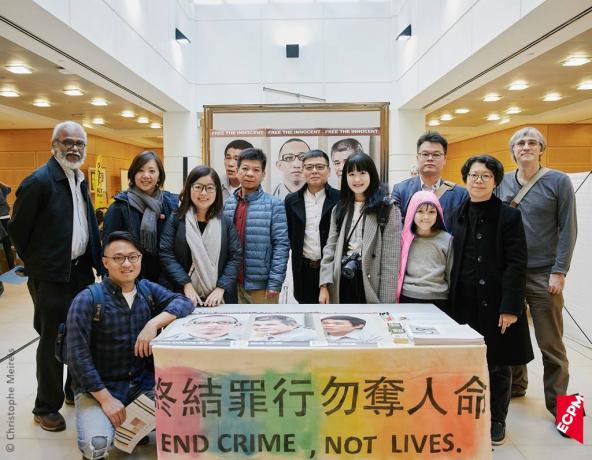
Article(s)
The Undercurrent: How we took part in the 7th World Congress Against the Death Penalty
By Wang Peiqi (Executive Secretary of the Taiwan Alliance to End the Death Penalty (TAEDP)), on 7 October 2019
As night fell, Xu Ziqiang and Zheng Xingze boarded a plane for Dubai together with a group of TAEDP members. Belgium was their final destination following this layover. This would be Ziqian’s and Xingze’s first time on European soil; they were preparing to take part in the World Congress Against the Death Penalty, held once every three years.
2019
Taiwan
Document(s)
A/HRC/51/7 – Advance Edited Version – Question of the death penalty
By Office of the High Commissioner for Human Rights (OHCHR), on 26 July 2022
2022
United Nations report
More details See the document
Pursuant to Human Rights Council decision 18/117, the present report is submitted to update previous reports on the question of the death penalty. In the report, the Secretary-General reaffirms the trend towards the universal abolition of the death penalty and highlights initiatives limiting its use and implementing the safeguards guaranteeing the protection of the rights of those facing this severe penalty. A minority of States continued to use the death penalty. Pursuant to Council resolution 22/11, the report also includes information on the human rights of children of parents sentenced to the death penalty or executed.
- Document type United Nations report
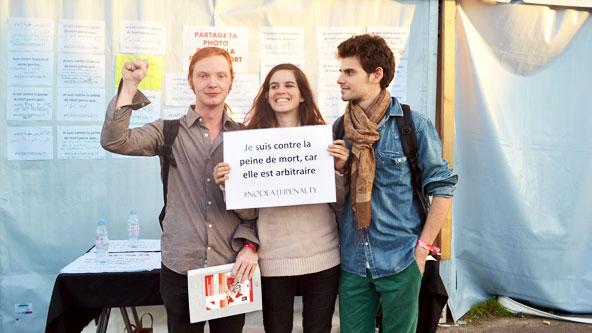
Article(s)
ECPM takes social media campaign to the fair ground
By Bronwyn Dudley, on 16 September 2014
World Coalition member organisation Ensemble contre la peine de mort (ECPM) was at September’s Fête de l’Humanité in Paris to spread awareness of the 12th World Day Against the Death Penalty on October 10.
2014
France
Intellectual Disability
Mental Illness

Article(s)
Calling on international bodies to condemn drug executions in Saudi Arabia and seek to stop them
By European Saudi Organization for Human Rights, on 1 December 2022
The European Saudi Organization for Human Rights and Harm Reduction International, and the World Coalition Against the Death Penalty along with 32 other NGOs have called on the International Narcotics Control Board and the United Nations Office on Drugs and Crime to act on urgent measures in response to the series of drug-related executions carried […]
2022
Drug Offenses
Saudi Arabia
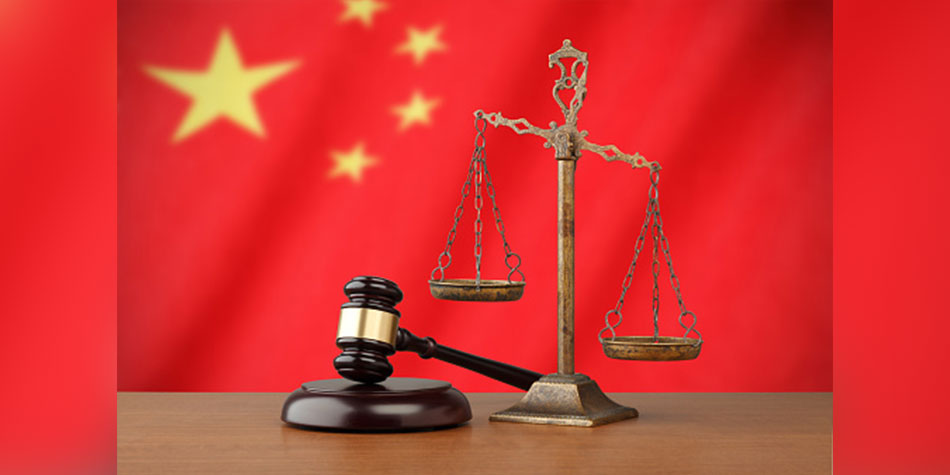
Article(s)
The Status Quo of China’s Death Penalty and the Civil Society Abolitionist Movement
By China Against the Death Penalty, on 15 February 2022
Translation of an article on the death penalty in China for the Beijing Olympics 2022, initially published by Taiwan Alliance to End the Death Penalty in October 2021 for World Day.
2022
China
Legal Representation
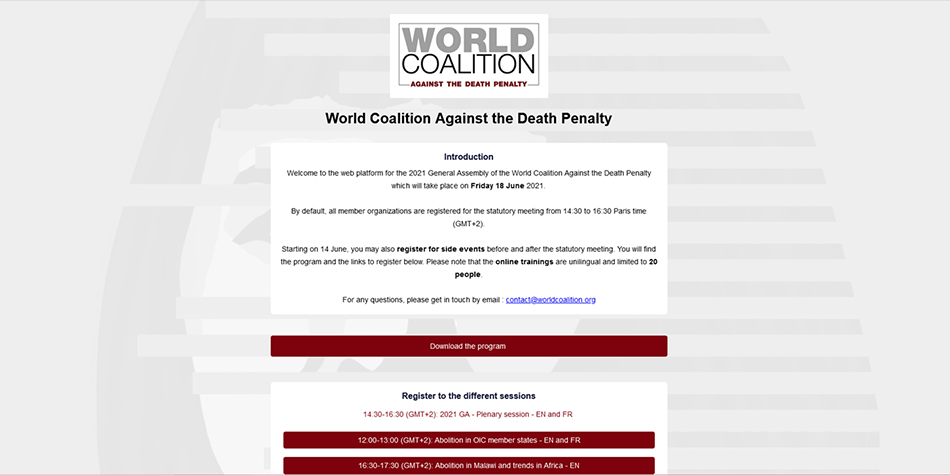
Article(s)
Recapping and video recordings of the side events of the 2021 General Assembly
By Elise Garel, World Coalition Against the Death Penalty, on 27 September 2021
On June 18, 2021, on the sidelines of the General Assembly of the World Coalition Against the Death Penalty, several events were organized. These events were an opportunity for the members of the World Coalition to address many issues related to the fight for the abolition of the death penalty.
2021
Juveniles
Legal Representation
Women
Document(s)
Death Row in the USA: Death Penalty Cases and Statistics by State
By Legal Defense Fund , on 13 May 2024
2024
Academic report
Death Row Conditions
United States
More details See the document
LDF issues a quarterly report entitled Death Row USA that contains death penalty information, death row populations by state, and other capital punishment statistics in the United States.
- Document type Academic report
- Countries list United States
- Themes list Death Row Conditions

Article(s)
Reflecting on the links between the death penalty and gender-based violence
By World Coalition Against the Death Penalty, on 25 November 2022
On 25 November 2022, International Day for the Elimination of Violence against Women, the World Coalition Against the Death Penalty, through the testimony of representatives of abolitionist member and partner organizations, wishes to raise awareness of the links between the death penalty and violence against women and gender minorities and call out the unjust and […]
2022
Gender
Kenya
Sri Lanka
Uganda
Women
Article(s)
High-Level Remote Panel on the Moratorium Resolution
By Louis Linel, on 6 November 2020
On 5 November, a webinar gathering high-level panelists was held by Ensemble contre la peine de mort / Together Against the Death Penalty (ECPM) as one of their initiatives for the moratorium campaign. Usually organized in New York, USA on the margins of the United Nations General Assembly (UNGA), the event had to be facilitated […]
2020
Algeria
Belgium
Democratic Republic of the Congo
France
Italy
Moratorium
Morocco
Switzerland
Document(s)
Extrajudicial, summary or arbitrary executions
By United Nations General Assembly, on 5 August 2022
2022
United Nations report
More details See the document
To mark the fortieth anniversary of the establishment of the mandate on extrajudicial, summary or arbitrary executions, the Special Rapporteur on extrajudicial, summary or arbitrary executions, Morris Tidball-Binz, offers a reflection from a historical perspective on the establishment of the mandate and the subsequent evolution of its working methods. He retraces the development of international standards and guidelines elaborated with the substantial contribution and support of the various mandate holders. The report also contains an analysis of the question of the death penalty from the perspective of whether it is compatible with the absolute prohibition of torture or other cruel, inhuman or degrading treatment or punishment and recommendations aimed at ensuring the protection of the right to life, as guaranteed under international human rights instruments.
- Document type United Nations report
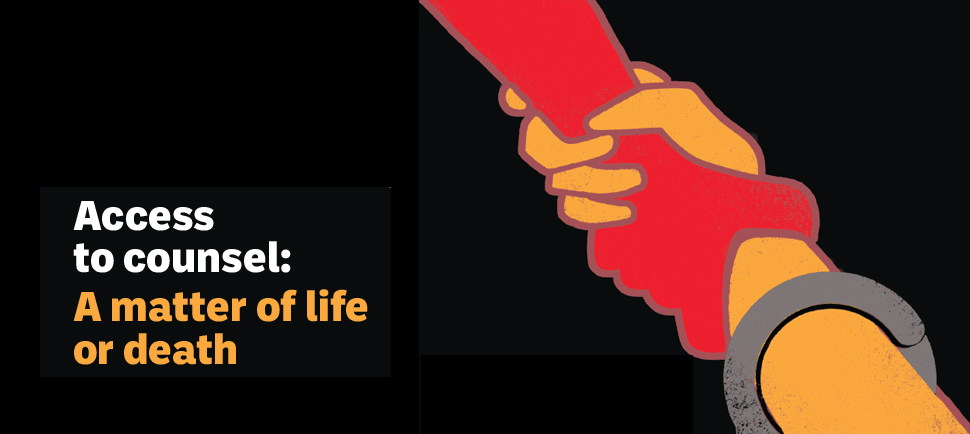
Article(s)
The 18th World Day Against the Death Penalty Highlights the Life-Saving Importance of Effective Legal Representation in Capital Cases
By Gia Tongson, on 18 November 2020
The 18th World Day Against the Death Penalty explored the theme “Access to Counsel: A Matter of Life or Death” in light of the continued execution of individuals who struggle to have adequate support from their lawyers, who consequently also face their own challenges in the judicial system. Having access to qualified and effective representation […]
2020
Australia
Belgium
Canada
Congo
Egypt
Fair Trial
France
Kazakhstan
Philippines
Portugal
Uganda

Article(s)
7th World Congress – The rights of children of parents sentenced to death
By Louis Linel, on 8 April 2019
This 10th October, the World Coalition will celebrate the 17th World Day Against the Death Penalty, which is focused on the rights of children whose parents are sentenced to death or executed. In time for the 30th anniversary of the International Convention on the Rights of the Child on 20 November, this year’s theme serves as a reminder that the death penalty constitutes a widespread violation of human rights, impacting even those unseen victims. Let’s look back at how this theme was discussed and addressed during the 7th World Congress.
2019
Juveniles
Document(s)
The Court is Satisfied with the Confession: Bahrain Death Sentences Follow Torture, Sham Trials
By Human Rights Watch, on 10 October 2022
2022
Article
Bahrain
arMore details See the document
In a February 2019 letter to the United Nations Office in Geneva, the government of Bahrain claimed that its courts “actually hand down very few death sentences.” In fact, since 2011, courts in Bahrain have sentenced 51 people to death, and the state has executed six since the end of a de facto moratorium on executions in 2017. As of June 2022, 26 men were on death row, and all have exhausted their appeals. Under Bahraini law, King Hamad bin Isa Al Khalifa has the power to ratify these sentences, commute them, or grant pardons.
- Document type Article
- Countries list Bahrain
- Available languages المحكمة تطمئن إلى سلامة الاعتراف : أحكام الإعدام في البحرين إثر التعذيب والمحاكمات الصُوَرية
Document(s)
Abolitionnist portrait 2004
By World Day against the death penalty , on 10 October 2004
2004
Campaigning
Trend Towards Abolition
frMore details See the document
Abolitionnist portrait 2004
- Document type Campaigning
- Themes list Trend Towards Abolition
- Available languages Portrait d'abolitionnistes 2004
Document(s)
Broken Promises: How a History of Racial Violence and Bias Shaped Ohio’s Death Penalty
By Death Penalty Information Center , on 14 May 2024
2024
NGO report
Fair Trial
Innocence
Trend Towards Abolition
United States
More details See the document
In January 2024, Ohio lawmakers announced plans to expand the use of the death penalty to permit executions with nitrogen gas, as Alabama had just done a week earlier. But at the same time the Attorney General and the Ohio Prosecuting Attorneys Association are championing this legislation, a bipartisan group of state legislators has introduced a bill to abolish the death penalty based on “significant concerns on who is sentenced to death and how that sentence is carried out.” The competing narratives make it more important than ever for Ohioans to have a meaningful, accurate understanding of how capital punishment is being used, including whether the state has progressed beyond the mistakes of its past.
- Document type NGO report
- Countries list United States
- Themes list Fair Trial / Innocence / Trend Towards Abolition
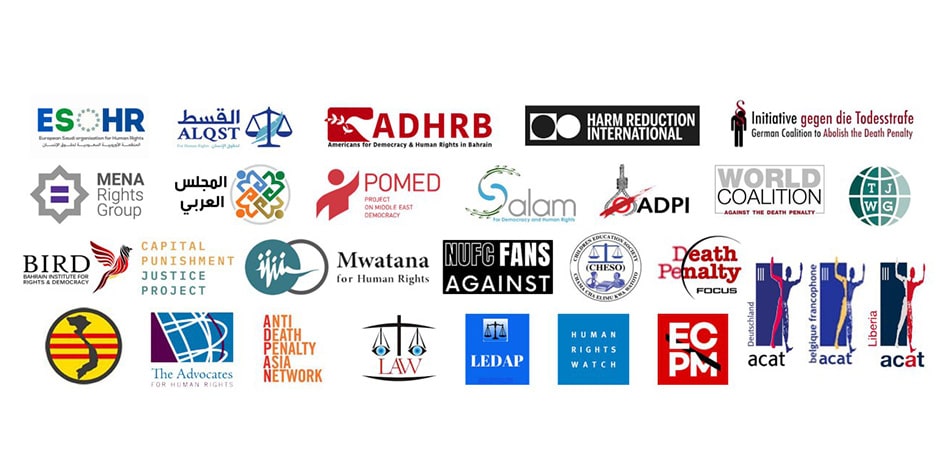
Article(s)
Escalating concerns over the lives of minors threatened with death in Saudi Arabia
on 3 May 2024
The undersigned organizations express their grave concern for the lives of minor defendants particularly the two young men, Yousif Al-Manasif and Ali Al-Mubaiouq, who are at imminent risk of execution in Saudi Arabia following confirmed information that the Specialized Criminal Court of Appeal (SCCA) has upheld their death sentences.
2024
Juveniles
Saudi Arabia
Document(s)
The Clemency Process in East and Southeast Asia
on 22 March 2022
2022
NGO report
China
Clemency
Indonesia
Japan
Malaysia
Singapore
Taiwan
Thailand
Viet Nam
More details Download [ - 0 Ko ]
In this report, we summarise the current international position on clemency and the death penalty and compare it to snapshots of the clemency processes in the following Southeast and East Asian countries: Thailand, Malaysia, Singapore, Indonesia, Vietnam, Japan, Taiwan, and China. All references to clemency in this paper are in the context of reprieve from the death penalty.
- Document type NGO report
- Countries list China / Indonesia / Japan / Malaysia / Singapore / Taiwan / Thailand / Viet Nam
- Themes list Clemency
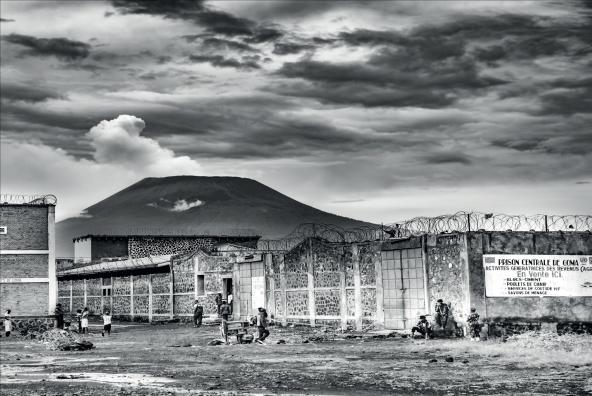
Article(s)
Death Sentences in the Democratic Republic of the Congo More Numerous than Previously Thought
By Bronwyn Dudley, on 12 March 2020
ECPM and CPJ published a report in December 2019 following a fact-finding mission in the Democratic Republic of the Congo (DRC) that took place earlier in the year. The results of the mission were astonishing – while the number of individuals sentenced to death was previously estimated to be 300 at most, the mission uncovered that there are at least 510 waiting execution. Liévin Ngondji, co-author of the report and President of CPJ, was in Paris in February 2020 to comment. Photo on the cover of the Report : 22 Oct 2015. Prison Centrale Goma, Democratic Republic of Congo copyright Ben Houdjik/ Shutterstock
2020
Cruel, Inhuman and Degrading Treatment and Punishment
Democratic Republic of the Congo
Fair Trial
Document(s)
Educational guide: teaching abolition
By World Coalition against the death penalty , on 10 October 2011
2011
Campaigning
Trend Towards Abolition
frMore details See the document
In 2009, the World Day Against the Death Penalty was
dedicated to the theme “Teaching Abolition”. The World
Coalition developed a teaching guide to be used in
schools throughout the world
- Document type Campaigning
- Themes list Trend Towards Abolition
- Available languages Guide pédagogique: éduquer à l'abolition
Document(s)
Special issue: a decade-long review of the death penalty for drug offences
By Harm Reduction International, on 7 May 2024
2024
NGO report
Drug Offenses
More details See the document
This report builds on the pioneering work HRI has been doing since its first ‘The Death Penalty for Drug Offences: Global Overview (‘Global Overview’) in 2007. It analyses how the landscape of the death penalty for drug offences has shifted in the last decade, looking at the main trends regarding people on death row, death sentences and executions for drug offences, as well as key developments at national and international level in the period between 2014 and 2023.
- Document type NGO report
- Themes list Drug Offenses

Article(s)
How Business May Contribute to Universal Abolition
By Louis Linel, on 29 January 2021
Non-governmental organizations (NGOs) have long been at the forefront of the movement for human dignity, as the main, highly-specialized – and sometimes isolated– champions for social justice. However, a new generation of advocates from the private sector, whose primary center of interest or area of expertise seems disconnected from international human rights standards, has been […]
2021
Public Opinion
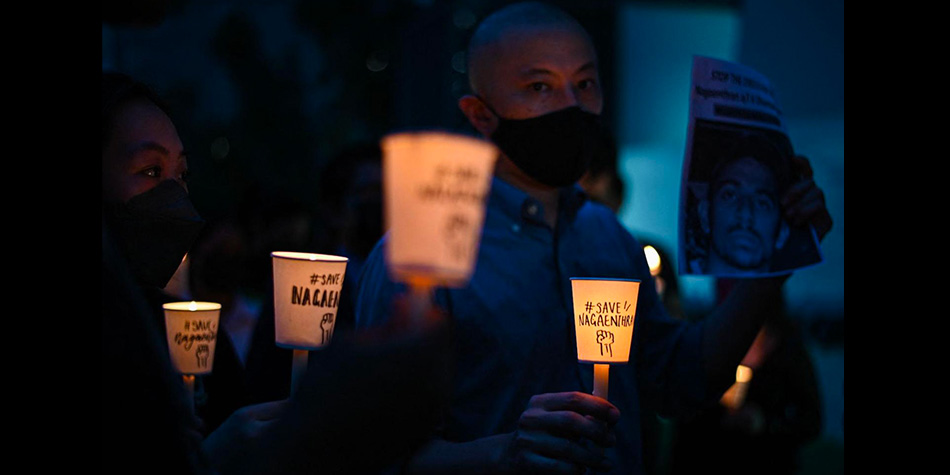
Article(s)
Death penalty: Singapore’s growing abolition movement
By Kirsten Han, on 5 September 2022
Article first published by the Interpreter Public support for capital punishment isn’t as overwhelmingand unshakeable as the government often portrays it to be.
2022
Singapore
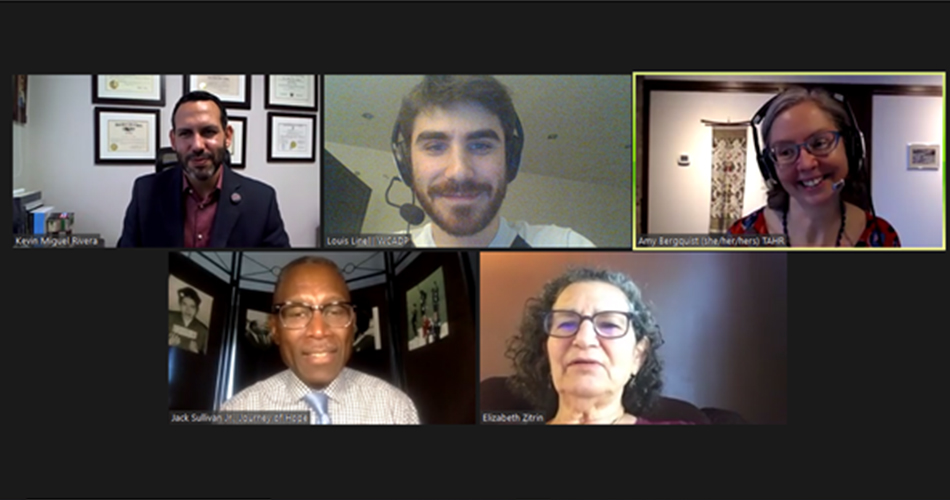
Article(s)
UPR 36th Session Debriefed on Facebook Live
By Louis Linel, on 17 November 2020
As the 36th session of the Universal Periodic Review (UPR) was being held under the auspices of the UN Human Rights Council from 02 to 13 November, the Advocates for Human Rights, a member organization of the World Coalition, facilitated Facebook live debriefings to cover the review of States that have not yet abolished capital […]
2020
Belarus
Jamaica
Liberia
Libya
Malawi
Maldives
United States
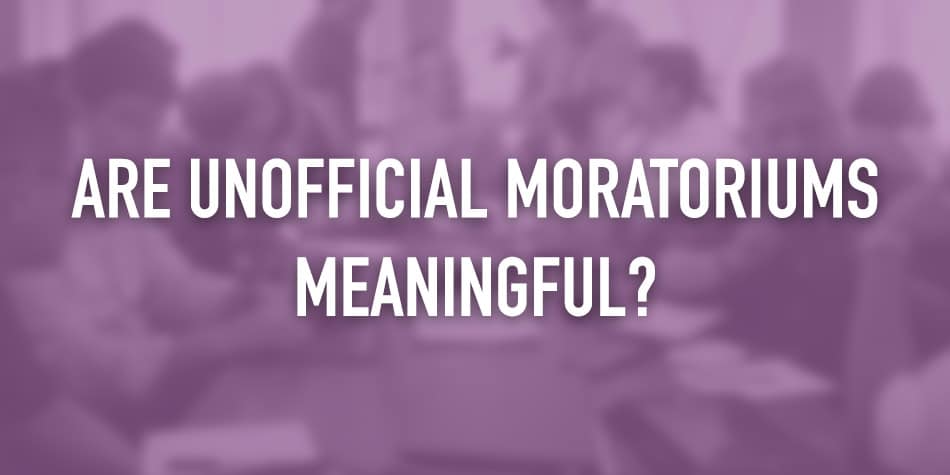
Article(s)
Importance of understanding phases of abolition: the danger of ‘abolitionist in practice’
By Venus Aves, Bronwyn Dudley, and Shahindha Ismail, on 6 November 2023
In July 2023, the World Coalition hosted a seminar in Malaysia in the context of its “Countries at Risk” project. This subject of informal moratoriums solicited much interest as participants considered preventative strategies for stopping a return to the death penalty, and what environmental factors need to be considered to implement those strategies. This article […]
2023
Moratorium
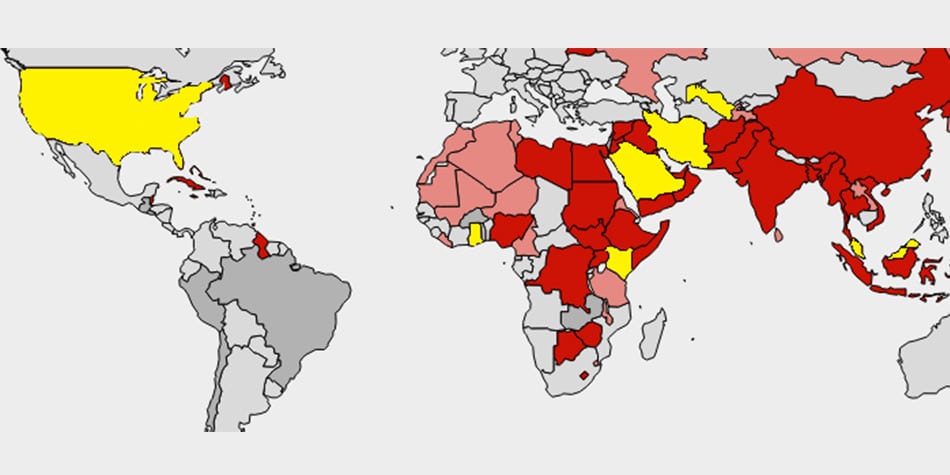
Article(s)
Mid-terms: A first half of 2023 marked by multiple abolitions
By Nellia Halimi, on 9 October 2023
The first seven months of 2023 have been rich for the abolitionist community with a new abolitionist country, a new abolitionist state in the United States, as well as progress for abolition within multiple countries. However, some countries continue to use the death penalty and there have been alarming increases in executions.
2023
Ghana
Iran (Islamic Republic of)
Kenya
Malaysia
Saudi Arabia
Singapore
Trend Towards Abolition
United States
Uzbekistan
Document(s)
Gender and Death Penalty Glossary
By World Coalition against the Death Penalty, on 1 August 2023
2023
World Coalition
Gender
frMore details Download [ pdf - 829 Ko ]
As part of the integration of a gender and intersectional approach into its strategy, the World Coalition Against the Death Penalty (World Coalition) decided to develop a glossary to identify and define the key terms of which the abolitionist movement should be aware to consider gender and other axes of intersectional discrimination at work in the capital punishment process, and more broadly to mainstream gender into their abolitionist work. This glossary was developed based on existing glossaries of World Coalition members on closely related topics, existing international definitions and standards established by international human rightsmechanisms as well as based on definitions written by international organizations specializing inwomen’s rights and LGBTQIA+ people’s rights.This glossary aims to support the abolitionist movement in recognizing the gender and intersectional biases at work in the judicial process leading to the death penalty and to contribute to the developmentof a common language around these issues, a process initiated a few years ago by members of theWorld Coalition Against such as the Cornell Center on the Death Penalty Worldwide. Moreover, this glossary also aims to promote the integration of a gender approach into the internal workings o fabolitionist organizations.
- Document type World Coalition
- Themes list Gender
- Available languages Glossaire Genre et Peine de mort
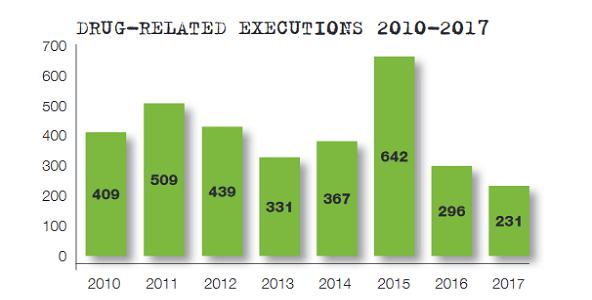
Article(s)
Iran Execution Trends Six Months After the New Anti-Narcotics Law
By Iran Human Rights (IHR), on 29 May 2018
On Monday, May 10, 2018, Iran Human Rights (IHR) reported the execution of Kiomars Nasouhi, a prisoner sentenced to death for drug offenses. This execution is the first drug-related execution registered by IHR since the latest amendment to the Anti-Narcotics Law was enforced on November 14, 2017.
2018
Iran (Islamic Republic of)
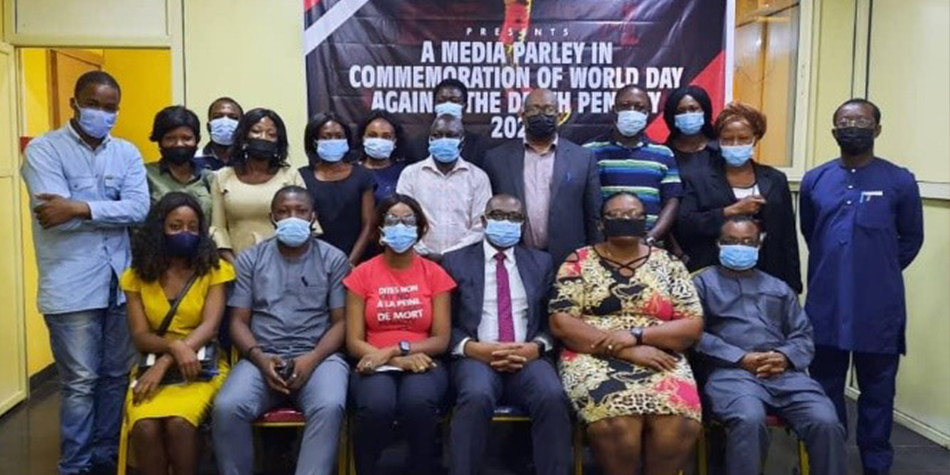
Article(s)
Women Sentenced to Death Showcased on the 19th World Day Against the Death Penalty
By Elise Garel, on 3 December 2021
With the theme “Women sentenced death: an invisible reality”, the 19th World Day Against the Death Penalty aimed to highlight the issues faced by women who are sentenced to death, executed, pardoned or exonerated around the world.
2021
Cameroon
Indonesia
Iran (Islamic Republic of)
Morocco
Nigeria
Pakistan
Sierra Leone
United States
Women
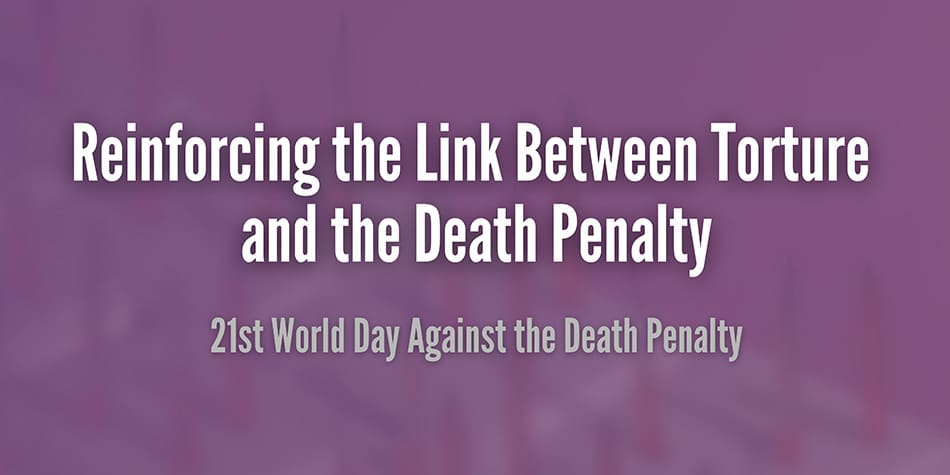
Article(s)
Reinforcing the Link Between Torture and the Death Penalty: 21st World Day Against the Death Penalty
By Venus Aves, on 17 November 2023
“There is no way in today’s world to apply the death penalty in a legal way, in a way that does not violate international law.” This was the bold and unequivocal assertion of former UN Special Rapporteur on Torture Juan Méndez in an online discussion with UN experts and exonerees organized by the World Coalition […]
2023
Cruel, Inhuman and Degrading Treatment and Punishment
Document(s)
Amnesty International Global Report : Death Sentences and Executions 2022
By Amnesty International, on 16 May 2023
2023
NGO report
aresfrzh-hantMore details See the document
This report covers the judicial use of the death penalty for the period January to December 2022. Amnesty International reports only on executions, death sentences and other aspects of the use of the death penalty, such as commutations and exonerations, where there is reasonable confirmation. In many countries governments do not publish information on their use of the death penalty.
Article(s)
Taiwan abolitionists remind their government of its promise
on 13 March 2011
After fresh executions, the Taiwan Alliance to End the Death Penalty has been campaigning to save the lives of five condemned prisoners, recalling the government to its commitments to human rights.
2011
Clemency
Death Row Conditions
Taiwan
Taiwan

Article(s)
Call for tenders for an external final evaluation
By World Coalition Against the Death Penalty, on 15 June 2021
External Evaluation of the project “Preventing the risk of resurgence of the death penalty in three abolitionist countries” of 36 months in the Maldives, Philippines and Turkey
2021
Maldives
Philippines
Turkey
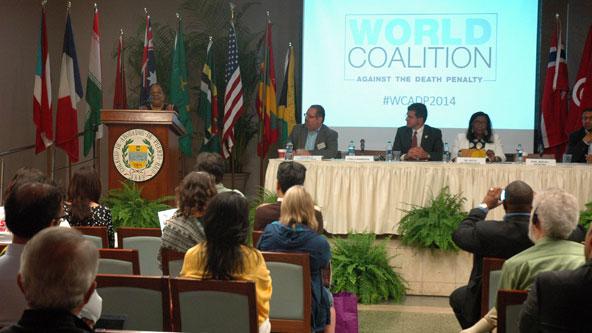
Article(s)
World Coalition raises mental health issues in administration of the death penalty
By Thomas Hubert (in San Juan, Puerto Rico), on 22 June 2014
World abolitionists gathered in Puerto Rico between 20-22 June to take stock on progress in the crucial Caribbean region and prepare for the next round of the fight against the death penalty.
2014
Puerto Rico
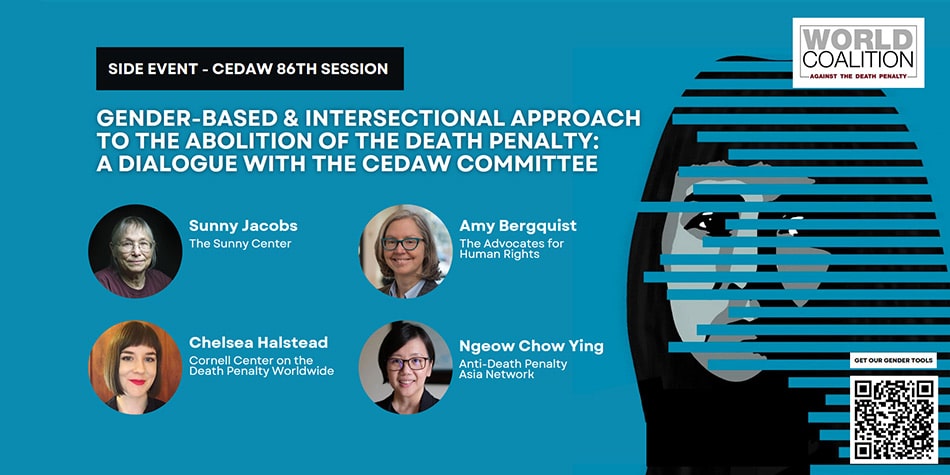
Article(s)
CEDAW experts welcome World Coalition members in the #CEDAW86 side event on gender and the death penalty
By Venus Aves, on 8 November 2023
On 22 October 2023, the World Coalition Against the Death Penalty (World Coalition) organized a closed-door side event on a gender-based and intersectional approach to abolition as part of the 86th session of the Committee on the Elimination of Discrimination Against Women (CEDAW).
2023
Gender

Article(s)
How Likely Is the Return of the Death Penalty in Israel?
By World Coalition against the Death Penalty, on 22 May 2023
Early 2023, the newly elected government of Israel announced an ensemble of judicial reforms; including a new bill that would introduce the death penalty for acts of terrorism. As of May 2023, the judicial reforms have been put on hold by the PM Netanyahu. This article takes a historical perspective to recontextualize the issue of […]
2023
Israel
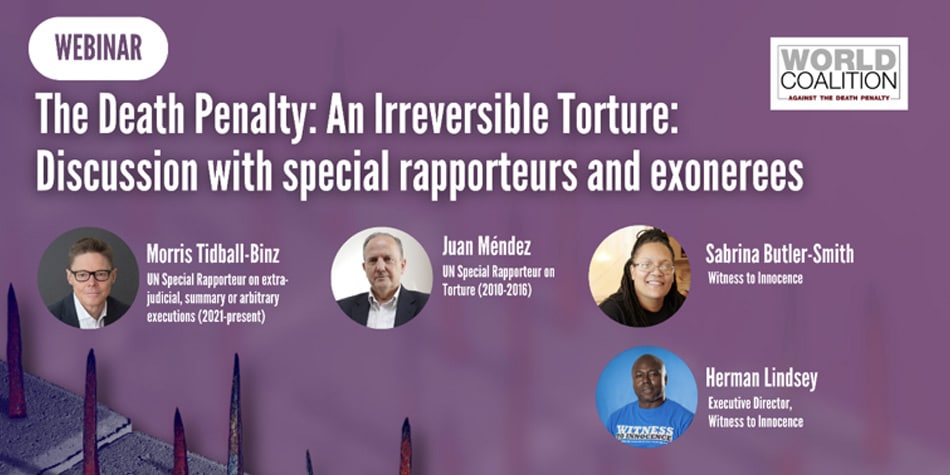
Article(s)
Highlights: Discussion on torture and the death penalty with UN experts and exonerees
By Venus Aves, on 6 November 2023
For the 21st World Day Against the Death Penalty dedicated to the reflection on the relationship between the use of the death penalty and torture or other cruel, inhuman, and degrading treatment or punishment started in 2022, the World Coalition hosted an online discussion with United Nations experts Morris Tidball Binz (UN Special Rapporteur on […]
2023
Cruel, Inhuman and Degrading Treatment and Punishment
Death Row Conditions

Article(s)
Statement on the end of the unofficial moratorium on executions in Myanmar
By the World Coalition Against the Death Penalty, on 11 August 2022
The World Coalition Against the Death Penalty, and ACAT-France, ACAT-Germany (and their partner organization Federal Association of Vietnamese Refugees in the Federal Republic of Germany), Amnesty International, Anti-Death Penalty Asia Network (ADPAN), Avocats Sans Frontières France, Centre for Civil and Political Rights, Citizens United for Rehabilitation of Errants (CURE International), Coalition Marocaine Contre la Peine […]
2022
Moratorium
Myanmar
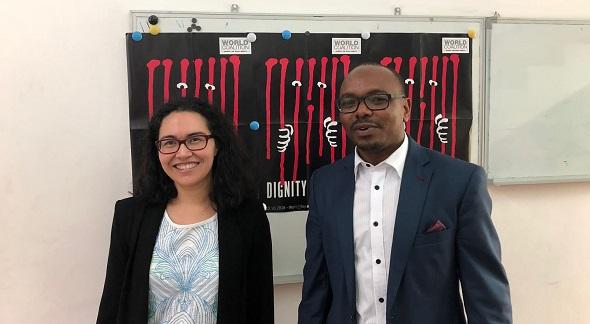
Article(s)
Hope resonates globally on World Day against the Death Penalty
By Nicolas Chua, on 25 October 2018
On 10 October 2018, abolitionist forces around the world celebrated the 16th World Day against the Death Penalty in a flurry of diverse activities and events meant to raise awareness on living conditions on death row. Activists in every continent mobilized civil society, challenged governments and reached out to the general public in a collective effort to promote and advance the common goal of universal, worldwide abolition of the death penalty.
2018
Death Row Conditions
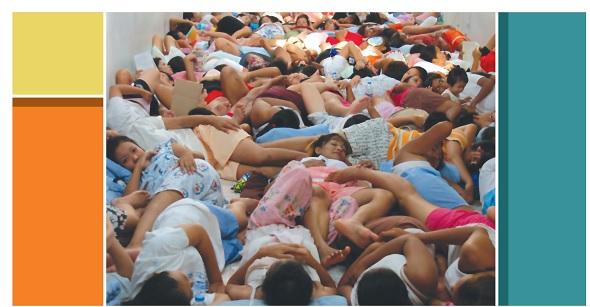
Article(s)
Global overview of women facing the death penalty
By Cornell Center on the Death Penalty Worldwide and World Coalition, on 10 October 2018
Launch of a groundbreaking report entitled “Judged for more than her crime: A Global Study on Women Facing the Death Penalty”
2018
Women
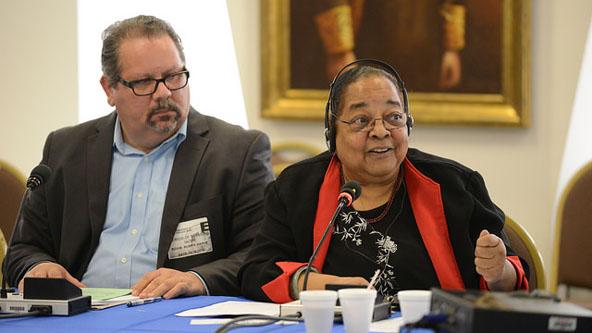
Article(s)
Greater Caribbean for Life addresses Inter-American Commission on death penalty in their region
on 19 March 2015
On Monday, 16 March 2015, the Greater Caribbean for Life (GCL) addressed the Inter-American Commission on Human Rights (IACHR) on issues relating to the death penalty in the Greater Caribbean, during a dedicated thematic hearing held at the Organisation of American States (OAS) headquarters in Washington, D.C., USA.
2015
Antigua and Barbuda
Argentina
Bahamas
Barbados
Belize
Bolivia (Plurinational State of)
Brazil
Canada
Chile
Colombia
Costa Rica
Cuba
Dominica
Dominican Republic
Ecuador
El Salvador
Grenada
Guyana
Haiti
Honduras
Jamaica
Mexico
Nicaragua
Panama
Paraguay
Peru
Saint Kitts and Nevis
Saint Lucia
Saint Vincent and the Grenadines
Suriname
Trinidad and Tobago
United States
Uruguay
Venezuela (Bolivarian Republic of)
Document(s)
Death by Design: Part 2
By The Wren Collective, on 23 January 2024
2024
NGO report
Legal Representation
United States
More details See the document
Published in December 2023.
In “Death by Design” Parts 1 and 2, Wren investigated the state of court-appointed capital representation in Harris County—the death penalty capital of the world. The second report examines why that poor representation has thrived, and the ways that the judges overseeing those cases have enabled it to continue that way.
Wren recommends a total overhaul to the system of capital representation for poor defendants in Harris County, with either the public defender absorbing those cases or the judges establishing a new, freestanding capital public defender that is independent from judicial oversight.
- Document type NGO report
- Countries list United States
- Themes list Legal Representation
Document(s)
Living Under Sentence of Death
on 22 April 2022
2022
Academic report
NGO report
Bangladesh
Death Row Conditions
More details See the document
In 2019-20, The Department of Law at the University of Dhaka, in collaboration with the Bangladesh Legal Aid and Services Trust (BLAST) and The Death Penalty Project, conducted a study to investigate socio-economic characteristics and experiences of death row prisoners in Bangladesh.
Bangladesh continues to retain and implement the death penalty, with several executions taking place each year. Excluding laws relating to the defence forces and international crimes, there are currently 33 crimes punishable by death. 25 of these offences are non-lethal and arguably do not meet the threshold of the ‘most serious crimes’ under international law.
Inspired by similar studies in other countries, a pilot study was commissioned to examine the demographics and experiences of those sentenced to death. Consistent with those studies around the world, our findings evidence that the death penalty in Bangladesh is disproportionately used against the most vulnerable and marginalised sections of society.
72% of prisoners were classified as economically vulnerable
53% of prisoners were in low-paid work or unemployed
87% of prisoners had no qualifications beyond secondary school level
15% of prisoners had no formal education.
The study also raised serious concerns around the treatment of prisoners, the length of time prisoners spent in prison under the sentence of death and the integrity of criminal investigations and trial.
33% of prisoners’ families alleged their relative had been tortured in police custody, 5% suspected this and 15% refused to comment
60% of respondents were not satisfied with the trial process, with some claiming that the courts had failed to properly appreciate the evidence
On average it took over 10 years for death row cases to be disposed by the HCD (where sentences are confirmed). Prolonged time spent in isolation on death row, has been declared inhumane and degrading in many countries.
The sample consisted of 39 individuals on death row, evidence from their case files and face-to-face interviews with their families were conducted under rigorous ethical guidelines to reveal their profiles and experiences. Despite its small size, the sample is indicative of the general prison population allowing us to draw conclusions on possible trends.
- Document type Academic report / NGO report
- Countries list Bangladesh
- Themes list Death Row Conditions
Document(s)
Amnesty International – Global Report : death sentences and executions 2023
on 29 May 2024
2024
NGO report
Trend Towards Abolition
aresfrMore details See the document
Amnesty International’s monitoring of the global use of the death penalty recorded 1,153 known executions in 2023, an increase by 31% from 883 in 2022. However, there was a significant decrease in executing countries, from 20 in 2022 to 16 in 2023.
- Document type NGO report
- Themes list Trend Towards Abolition
- Available languages التقرير العالمي لمنظمة العفو الدولية أحكام وعمليات اإلعدام في 2023Informe Global de Amnistia internacional: condenas a muerte y ejecuciones 2023Amnesty international - Rapport mondial : condamnations à mort et exécutions 2023

Article(s)
The Sunny Center
By Jessica Corredor, on 30 July 2018
“Extraordinary things can happen to ordinary people and still be OK »The Sunny Center is a place like no other place in the world. Perched on the top of a hill, it is surrounded by lakes and hills that multiply as far as the eye can see. The landscape is breath-taking. But the landscape is nothing compared to the founders of the Sunny Center. Sunny Jacobs, 72, and Peter Pringle, soon 80, began welcoming innocent people into their homes in 2011.
2018
Death Row Conditions
Innocence
Ireland

Article(s)
Child rights highlighted on the 17th World Day Against the Death Penalty
By Dinda Royhan, Majdoulin Sendadi, on 25 November 2019
On 10 October 2019, we celebrated the 17th World Day against the Death Penalty with various activities aimed to raise awareness on the death penalty and children as its unseen victims. Abolitionist forces in the two continents that gather most retentionist countries, Africa and Asia, were particularly active in raising awareness on the necessity to abolish the death penalty and its impacts on children this year.Through conferences, meetings, exhibitions, art installations, prison visits, radio broadcasts, flash mobs, dances and many other kinds of events, abolitionist forces in every continent took action to raise awareness about the use of death penalty in their national jurisdiction. The death penalty not only violates the fundamental right to life, but it also impacts the rights of children when the State sentences or executes a parent and has been found to have a long-term impact on the child’s best interest.
2019
Juveniles
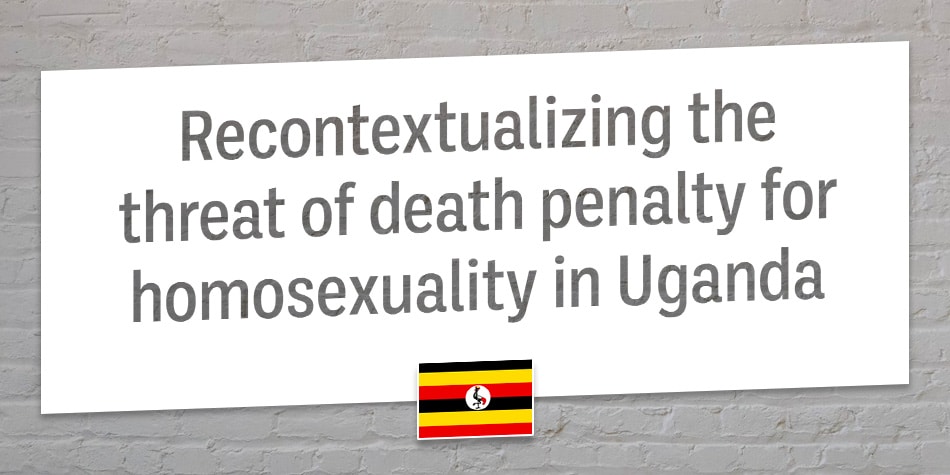
Article(s)
Recontextualizing the threat of death penalty for homosexuality in Uganda
By Méline Szwarcberg, on 2 May 2023
On Tuesday March 21, the Ugandan parliament passed a law that severely criminalizes people who have consensual same-sex relations. At the end of April, the law had still not been validated by the President Museveni. Among a range of harsh penalties, the law would allow the death penalty for the crime of « aggravated homosexuality […]
2023
Gender
Uganda
Document(s)
Proven With(out) Certainty: How Judges Sentence Defendants to Death for Drug Offences in Iran
By Abdorrahman Boroumand Foundation for the Promotion of Human Rights and Democracy in Iran, Monash University and ELEOS Justice, on 6 February 2024
2024
NGO report
Drug Offenses
More details See the document
Published in April 2023.
Despite the reduction in the number of executions for drug offences during 2018-2020, a sudden increase in executions was recorded during 2021-2023: at least 131 known executions were recorded for drug offences in 2021, 253 executions in 2022, and 82 executions during the first 3 months of 2023 (Table). However, information concerning the death penalty in Iran is notoriously difficult to obtain because of the secrecy surrounding the country’s criminal justice process. This note provides a rare glimpse into the application of capital drug laws in the Islamic Republic of Iran. It exposes the idiosyncratic practices of the judiciary and its decision-making, using cases concerning the death penalty for drug offences—its imposition prohibited long under international standards. These judgments repeatedly use the language of ‘certainty’ in convicting the accused. In reality, to those familiar with basic fair trial standards, they raise serious concerns about miscarriages of justice that could potentially result in the erosion of legitimacy of the criminal ‘justice’ system in Iran.
- Document type NGO report
- Themes list Drug Offenses

Article(s)
Abolition of the death penalty at the United Nations Human Rights Council 56th session
on 30 August 2024
The United Nations Human Rights Council met for its 56th Regular Session from June 18 to July 12, 2024. If you missed it, here is what happened regarding the abolition of the death penalty!
2024
Trend Towards Abolition

Article(s)
NGOs voice fears for dozens of Egyptian prisoners, and hundreds of others, facing execution for drugs-related offenses in Saudi Arabia
By World Coalition Against the Death Penalty, on 13 September 2024
We, the undersigned organisations, are gravely fearful for the lives of hundreds of prisoners threatened with imminent execution in Saudi Arabia on drugs-related charges, including 33 Egyptians on a single wing of Tabuk Prison.
2024
Drug Offenses
Saudi Arabia

